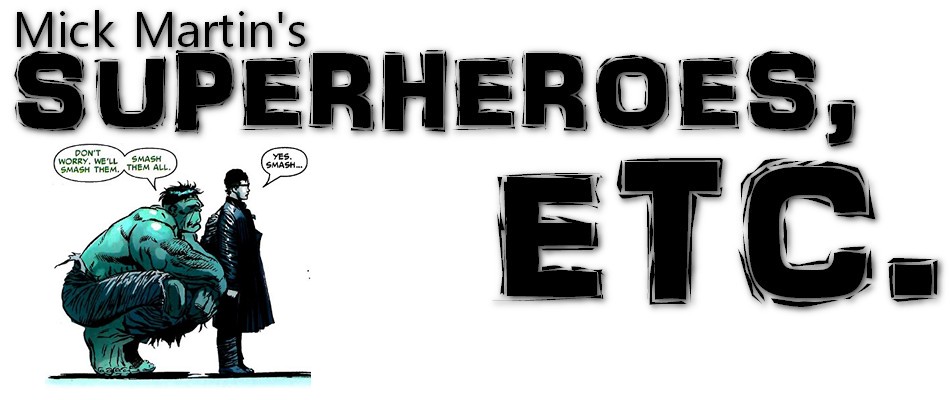The year Lord of the Rings: Return of the King took home its big basket of Oscars, I was living with a woman I now call the Five Year Bitch. If memory serves, during that ceremony the cameras frequently cut to the actors who played the hobbits in Return of the King. For some reason, it tickled me that all four of them chose to sit together. Every time they would show up on the screen; I would cry out in a high-pitched, fake English accent, "We're the hobbits!" The Five Year Bitch enjoyed this at first but quickly grew annoyed and I knew the next time she went on one of her crying marathons, this running gag would be used as proof that I didn't really love her, that I didn't respect her, that most of her problems were my fault, etc. And I wasn't wrong.
That's the best Oscars memory I have.
The other Oscars memories are uniformly bad, and mainly involve the negative impression the two-faced douchebags of Hollywood leave when no one's around to write them dialogue. Like Michael Moore getting booed off stage one year and, the following year, every asshole who booed him championing Moore's cause because it had become more acceptable in the interim. Like Billy Crystal singling out Bill Murray's visible disappointment upon losing for Best Actor. Like Annie Lennox making a wet-faced monkey of herself and making sure that neither of the other two people who won Best Original Song for "Into the West" had time to thank anyone. Like every time the music drowned out the winners for things like Best Sound Editing and Best Costume Design because the winners aren't as rich and no one's ever beat off to them.
As pretty much anyone who watched it knows, last night's ceremony did not fight very hard to prove Mick wrong. I was only willing to stay up until a little after 10, and even then the only thing keeping me going was the furious stream of Twitter snark. It didn't take long for me to realize I was tweeting, and reading other tweets, on my Blackberry often enough that my eyes were on my phone more than they were on the screen. Patton Oswalt's tweets deserve more thanks for any enjoyment I received from last night's ceremony than anyone who took the stage.
Since I did not watch it to the end, arguably this list could not possibly be comprehensive, but if you tuned in last night you know that a list of reasons to hate the ceremony never could be comprehensive.
10. Celine Dion's commercial. I forget exactly what it was for, but at some point during the broadcast Celine Dion was in a commercial about the Lung Association or the Heart Association or some group that does really good things that you can't really criticize without looking like an assface. If Dion's going to be in a commercial, she shouldn't be allowed in a commercial you can't yell at without feeling like a jerk. Like British Petroleum. Or Evil, Inc.
9. The fact that every presenter and winner who otherwise had nothing funny or worthwhile to say referenced Melissa Leo's f-bomb for an easy laugh.
8. When Kevin Spacey opened his spiel with some awkward singing and twitter lit up like a fucking Christmas tree with predictions that Spacey would be next year's host. Yeah. We need more actors singing for the Oscars. Maybe they can get Christopher Walken as a tap-dancing host, too.
7. Toy Story 3 winning and/or being nominated for so many awards. I saw it. It was a good, fun flick. It didn't deserve to be nominated so much. It certainly didn't deserve to be nominated for Best Picture. And how the fuck was it nominated for Best Adapted Screenplay? Because it was "based on the previous films?" That's a bunch of bullshit. That's an amount of bullshit they needed a truck to deliver. In fact, not only is it bullshit, it's actually proof of how much the movie didn't deserve to be nominated so much. Saying it's actually an "Adapted Screenplay" and that it was adapted from the previous films is pretty much the same as saying that it was just another fucking sequel.
6. Trent Reznor got on stage and didn't say anything disparaging about any women he went out with. In fact, I think he said something nice about his wife. What the fuck, Trent?
5. The hosts. Franco looked like he would've rather been anywhere but on stage at the Oscars. Anne Hathaway, on the other hand, committed herself fully to the gig but just came off as annoying and over-eager to please.
4. Justin Timberlake and Mila Kunis. I mean, were they even trying for a laugh? You have to work hard to be more awkward and annoying than Matthew McConaughey and Scarlett Johansson, and man did Timberlake/Kunis work hard.
3. Jokes about Charlie Sheen or any other celebrities currently stuck in the tabloid penalty box. Dear Hollywood, we do not need any more proof that your collective self is nothing but a big cool kids' table. We do not need to see any more of the hypocrisy of your actors whining about paparazzi as if photographers caused the Holocaust while simultaneously using tabloid-derived humor to make themselves sound funny and cool; like the teacher who picks on the unpopular kid to get the class on his/her side. Just stick to your other shitty jokes and stop throwing each other under the bus.
2. The King's Speech's success. It was a good movie, but it did not deserve all of its victories and it certainly did not deserve Best Picture. I saw half of the films nominated for Best Picture and with the exception of Toy Story 3 any one of those other films (True Grit, Inception and 127 Hours) were more deserving. I believe Colin Firth deserved his Best Actor win, but ironically I think that's part of why the film he won it for shouldn't have won Best Picture. I think Firth did his job too well. I think Firth did a magnificent job of portraying an ascending king who was held back by a speech impediment, who desperately wanted to be heard, who desperately wanted the approval of his father, who desperately wanted to prove he was worthy of his royal blood, and who at no point in The King's Speech seemed like he gave one hot shit about the horrorshow his country was about to be thrust into. I don't know if that was what George VI was really like, but that's the character Firth masterfully portrayed.
1. The very nature of the thing, and I doubt I'm the first person to say it. The Oscars Ceremony is an attempt to give recognition to people who get nothing but recognition. Which isn't to say that movie makers don't deserve the opportunity to honor each others' achievements, but the fact that there is actually an awards "season" is proof enough of the masturbatory aspect of the thing. We all contribute to the tugfest by watching and this blog is, admittedly, part of the collective jerk.
Monday, February 28, 2011
Top 10 Reasons to hate the Oscars
Labels:
Movies,
Television
Sunday, February 27, 2011
Let me take that back
In a recent e-mail exchange, my good friend Charlie made me realize I have turned this blog into the one thing I never wanted it to be - a chore.
Ironically, I think a lot of the things I've done that turned it into a chore are things I did with the intent of making the blog easier and more fun. In particular, a lot of the decisions I made about the blog lately were geared towards making it easier for me to decide what I would write about. For example, there was the theme week idea. If the theme of the week is samurai comics, that narrows things down. The same goes with the decision to not buy any new graphic novels until I'd reviewed all of the ones I own. Of course, there's the simple fact that in spite of the many times I've said I wanted to write about more than comics, Superheroes, etc. pretty much has been nothing but comics lately.
There were other factors that went into all those decisions, but the common thread is that they all narrowed the scope of the blog so I wouldn't need to spend so much time arguing with myself over what I would write about on any given day. It may seem silly that deciding what to write about would cause so much frustration - and you're right it is silly - but it does and I won't bore you with the reasons. Regardless, none of those decisions have made writing the blog easier. They've made it seem more like a daily assignment. Something to bear.
So, all that crap about theme weeks and not buying new GNs until I've reviewed all the old ones; forget that. I'm not doing any of it. I am still committed to updating the blog every weekday for 6 months, but my other pledges and rules need to get flushed. I was dangerously close to gutting the blog of its fun. Thanks for reminding of that, Chuck.
Ironically, I think a lot of the things I've done that turned it into a chore are things I did with the intent of making the blog easier and more fun. In particular, a lot of the decisions I made about the blog lately were geared towards making it easier for me to decide what I would write about. For example, there was the theme week idea. If the theme of the week is samurai comics, that narrows things down. The same goes with the decision to not buy any new graphic novels until I'd reviewed all of the ones I own. Of course, there's the simple fact that in spite of the many times I've said I wanted to write about more than comics, Superheroes, etc. pretty much has been nothing but comics lately.
There were other factors that went into all those decisions, but the common thread is that they all narrowed the scope of the blog so I wouldn't need to spend so much time arguing with myself over what I would write about on any given day. It may seem silly that deciding what to write about would cause so much frustration - and you're right it is silly - but it does and I won't bore you with the reasons. Regardless, none of those decisions have made writing the blog easier. They've made it seem more like a daily assignment. Something to bear.
So, all that crap about theme weeks and not buying new GNs until I've reviewed all the old ones; forget that. I'm not doing any of it. I am still committed to updating the blog every weekday for 6 months, but my other pledges and rules need to get flushed. I was dangerously close to gutting the blog of its fun. Thanks for reminding of that, Chuck.
Friday, February 25, 2011
HULK IS THE STRONGEST ONE THERE IS!!!!!! : The Puffball Collective - What an Asshole
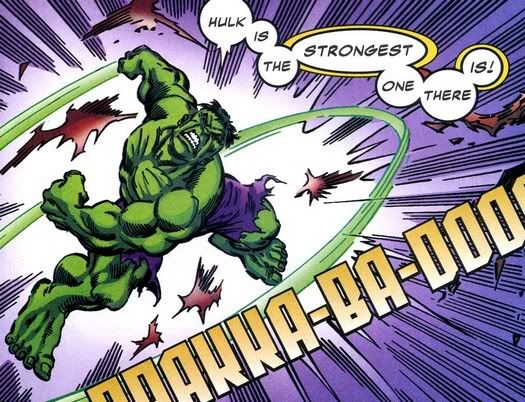
Whatever the Hulk’s stories achieved over the years, producing infectious villains isn’t one of them. Love ‘em or hate ‘em, the distinguished men and women of Hulk’s rogue’s gallery don’t see a lot of travel outside the home title. For the most part, the only Hulk-centric bad guys who get significant time in other titles are ones who “belonged” to other heroes first like Rhino and the Absorbing Man. As prone to resurrection as super-people may be, with notable exceptions Hulk villains are some of the most likely to stay dead simply because no one cares enough about them to bring them back.
Regardless, as far as this Hulkling is concerned, no Marvel villain so thoroughly deserved his horrific fate as the dark-hearted bastard who lived and died for less than a year in Incredible Hulk – the Puffball Collective.
The Puffball Collective was a product of Bill Mantlo’s final, epic Incredible Hulk storyline known to Hulk fans as “The Crossroads Saga” ; a story that left the groundwork for Peter David’s definitive run on the title and one that was likely a major influence on Greg Pak’s “Planet Hulk.”
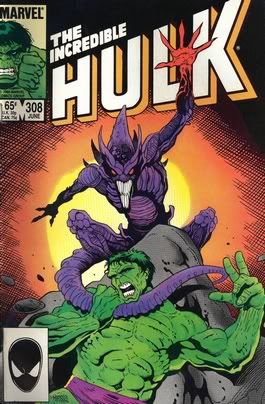 For a time Bruce Banner could control his transformations into the Hulk’s body and could take charge of the Hulk’s body once he did change. He was pardoned for his crimes, was invited to rejoin the Avengers (an invitation he turned down, much to my disappointment at the time), and tried to rebuild his life. Unfortunately, knowing Hulk and Doctor Strange were friends, the villain Nightmare slowly infiltrated Banner’s mind through his dreams and was determined to use the Hulk to kill Strange (and that is why Banner Hulk was such a dick in Secret Wars). The end result was what Strange believed to be the equivalent of Bruce Banner’s psychic death, and the Hulk that was left behind was more powerful and savage than ever. He could not speak at all, even in the classic monosyllabic “Hulk Smash” speech pattern, and simply lashed out at everything and everyone within reach. Strange’s solution was to banish the Hulk to a dimensional crossroads connected only to worlds either uninhabited or inhabited by creatures whose physical power was comparable to that of the Hulk’s. The green guy spent over a year in the Crossroads, from Incredible Hulk #s 301 – 313 and Incredible Hulk Annual #13 – until he was finally liberated by the unwitting Canadian superteam Alpha Flight.
For a time Bruce Banner could control his transformations into the Hulk’s body and could take charge of the Hulk’s body once he did change. He was pardoned for his crimes, was invited to rejoin the Avengers (an invitation he turned down, much to my disappointment at the time), and tried to rebuild his life. Unfortunately, knowing Hulk and Doctor Strange were friends, the villain Nightmare slowly infiltrated Banner’s mind through his dreams and was determined to use the Hulk to kill Strange (and that is why Banner Hulk was such a dick in Secret Wars). The end result was what Strange believed to be the equivalent of Bruce Banner’s psychic death, and the Hulk that was left behind was more powerful and savage than ever. He could not speak at all, even in the classic monosyllabic “Hulk Smash” speech pattern, and simply lashed out at everything and everyone within reach. Strange’s solution was to banish the Hulk to a dimensional crossroads connected only to worlds either uninhabited or inhabited by creatures whose physical power was comparable to that of the Hulk’s. The green guy spent over a year in the Crossroads, from Incredible Hulk #s 301 – 313 and Incredible Hulk Annual #13 – until he was finally liberated by the unwitting Canadian superteam Alpha Flight.I was 9 or 10 when the Crossroads Saga began. I had never read comics more bleak or depressing and I desperately wanted the Hulk to find his way home. Most of the Crossroads stories involved the Hulk making friends he would lose either to death – like the spinal-cord symbiote of Incredible Hulk Annual #13 who temporarily restored some of Hulk’s intelligence and whose dying wish was to see the stars; or the gentle, elephantine giant of Incredible Hulk #304 who was executed for his pacifism – or to brutal transformation, like the emerald-skinned beauty of Incredible Hulk #s 302 and 303 who was so reminiscent of the late Jarella. Adding insult to injury, the Hulk’s power was not nearly as impressive in the violent worlds of the Crossroads as it was on Earth. The Hulk never had his ass handed to him more frequently, perhaps most memorably by a red-skinned child in Incredible Hulk #303.
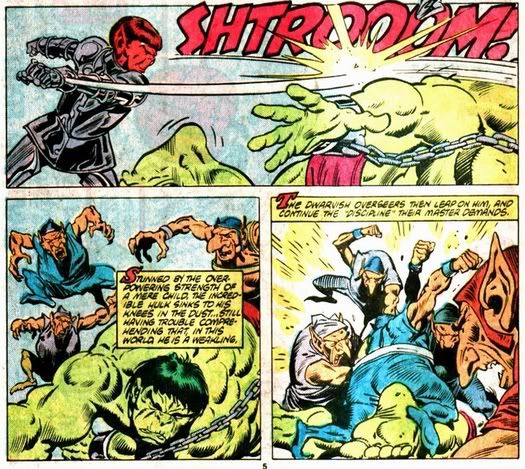
In the beginning, there was one bright spot of hope – the Puffball Collective. He showed up for the first time in Incredible Hulk #301. The creature was exactly what it sounded like. It was a floating cloud of white, puffy balls acting in tandem like a swarm of insects. It could assume different shapes, enjoyed an encyclopedic knowledge of the Crossroad’s different portals, and was telepathic. The one thing it couldn’t do was leave the Crossroads. Unlike the Hulk who could pass through the portals to other worlds as he wished, the Puffball Collective was stranded within the Crossroads itself; cursed to keep company only with the place’s bizarre signpost, the seemingly endless pathways, and the portals they led to.
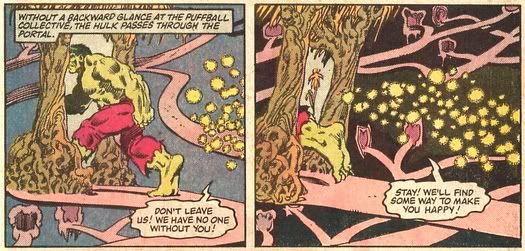
As soon as the Hulk appeared, the Puffball Collective set about winning him over. He pulled images from what was left of the Hulk’s mind and assumed shapes he thought would be pleasing to him (like that of Bruce Banner – he obviously didn’t know the Hulk very well). When he sensed the Hulk was hungry, he assumed the shape of a banquet table loaded with food, though the Hulk didn’t react well when none of it was edible. When the Hulk returned from the world where his symbiote friend died, the Collective assumed the shape of a bed for his fellow prisoner to rest from the emotional wound he was too savage to even remember.

The Hulk proved stingy with his trust. Every time the Hulk entered another portal, the Puffball Collective begged and pleaded for the Hulk to stay with him or to take him along, but the Hulk had only two reactions to the Collective – indifference and rage.
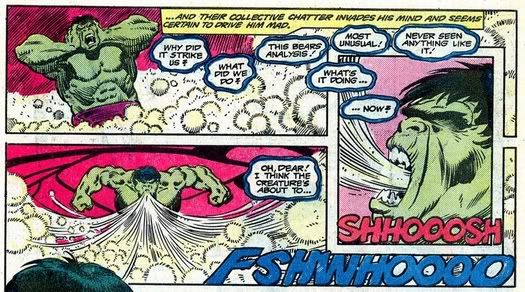
It took the unexpected arrival of the U-Foes at the end of Incredible Hulk #304 for the Puffball Collective to win any trust from his fellow prisoner. Risking torment and death to help the Hulk against the dark parody of the Fantastic Four, the Collective used his knowledge of the Crossroads’ portals to help Hulk defeat them. He had Hulk lure X-Ray, a villain made of radiation, into the portal of a world of radiation-eating monsters; and X-ray’s sister Vapor, made of gas, into a world without an atmosphere. The Puffball Collective’s aid and the sacrifice of some of his collective finally convinced the Hulk that he was a friend.
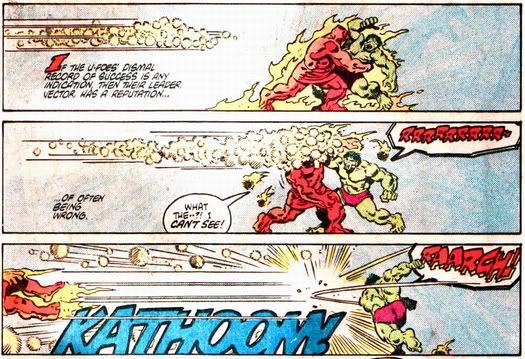
Once the friendship was forged, the Hulk’s loyalty was unwavering. Soon after the defeat of the U-Foes, more of Hulk’s old acquaintances appeared to test that loyalty. The energy-sucking giant Klaatu who first appeared in Incredible Hulk #136 entered the Crossroads, and not far behind was the Pequod-inspired spaceship The Andromeda. Back when Roy Thomas and Herb Trimpe teamed up on the green guy’s adventures, the crew of the Andromeda had recruited the Hulk in their quest to kill Klaatu, and this time was no different. The Hulk would only board The Andromeda if his new Puffball friend could come with him and the ship’s First Mate and Captain – Xeron the Star Slayer and the cybernetic Captain Cybor respectively – didn’t object. Unfortunately, objections or not, the spell that kept the Puffball in the Crossroads was still active, and when The Andromeda escaped the Crossroads to chase Klaatu, the Collective was left behind. The Hulk’s shipmates ignored his howls of protest until finally his fists rocked the spaceship in the middle of its battle with the big, dumb Klaatu (who, irrespective of the obvious Moby Dick analogy, is kind of like Galactus if Galactus never spoke and rather than constructing giant machines and recruiting heralds, just wandered around aimlessly). To quell his anger they returned to the Crossroads for the Puffball Collective and used a force field projector to keep him on board the ship before pursuing Klaatu a second time. The force field worked, though the battle with Klaatu went badly for The Andromeda. They all died, just like they did last time, and the Hulk and the Puffball Collective returned via Doctor Strange’s failsafe spell to the Crossroads. What was most significant perhaps during the Klaatu story was the fact that the Hulk’s friendship with the Collective, combined with the Collective’s telepathic urgings, helped restore a semblance of his old intelligence. For the first time since his banishment, except when his connection to the symbiote of Incredible Hulk Annual #13 lent him intelligence, the Hulk spoke.
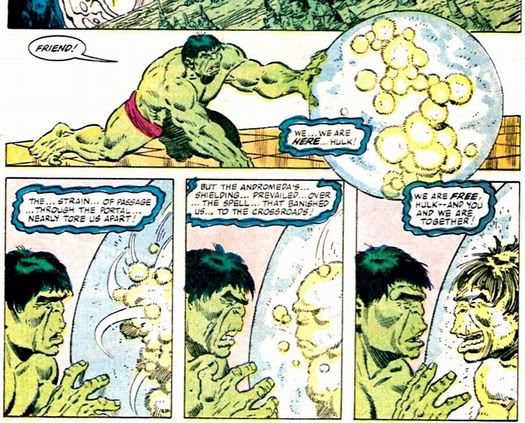
In Incredible Hulk #308, the Puffball Collective’s true intentions were finally revealed. He told the Hulk that inquisitive members of his race accidentally unleashed demons upon his world. He managed to escape to the Crossroads but the demons sealed the portal to his home. Seeing the mystic chains and wall blocking the portal and wanting to please his new friend, the Hulk severed the chains and blasted the wall to pieces. The Hulk and the Collective entered the portal to find the world in ruins. Seeing the Hulk was tired, the Collective told him to rest, that he would watch over him as he slept, and from there things fell apart. The Hulk was attacked by a demon as he slept and seeing the Collective was nowhere in sight, he assumed the Puffball Collective slain by the same demon. When the demon defeated the Hulk and a whole army of the things appeared, so did the Puffball Collective. Sadistically enjoying the beast’s confusion and heartache, the Collective explained to the Hulk that he was the one who let the demons loose upon the world, and that it was no accident. He did not escape his world, he was banished from it and his brethren sealed the portal; sacrificing themselves to make sure the demons did not run loose through all the other worlds connected to the Crossroads. Using Strange’s failsafe spell, the Hulk returned to the Crossroads and was able to seal the portal just in time by reattaching the chains he had severed. He watched the demons turn on his “friend” just as the portal closed.
As a child, no comic book story had such a powerful impact on me. As I’ve written before, it was a relatively friendless childhood that attracted me to the Hulk’s stories. I thought the kids at school misunderstood me just like the other heroes misunderstood the Hulk. In later years when friends would tell me how strongly they related to the X-Men as kids because they grew up feeling like outsiders, I enjoyed a silly and quiet sense of superiority. The muties may have been outsiders, I thought, but at least they had each other. The Hulk was the real outsider. He had no one.
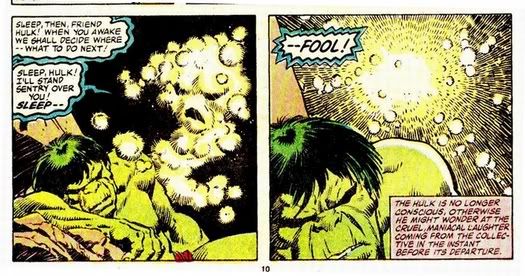
For the Hulk’s one bizarre, constant friend to prove false – in a storyline when making new friends and losing them to horrific deaths seemed like an hourly occurrence – was utterly heart-shattering. I remember reading that first revealing panel, when the Collective yells “FOOL!” - and needing to stare at it a while before turning the page. I just didn’t want to believe it. And once it was clear that the Collective was an evil prick, I was angry. And I wasn’t angry at the character, I was angry at whatever bastards put together that comic. I kept reading Incredible Hulk purely out of faith that eventually there was a light at the end of the tunnel; that the Hulk would go home and find new friends.
Though he would never been heard from again, I have never felt as much absolutely unforgiving hatred for a comic book villain as I did for the Puffball Collective. I wouldn’t put any money that doesn’t come from a board game on the guy returning to comics any time soon. But if he does, rest assured, I’ll be there. I’ll be ready with a flamethrower, a vacuum cleaner, and one of those roller thingees you rub on your clothes to get rid of cat hair.
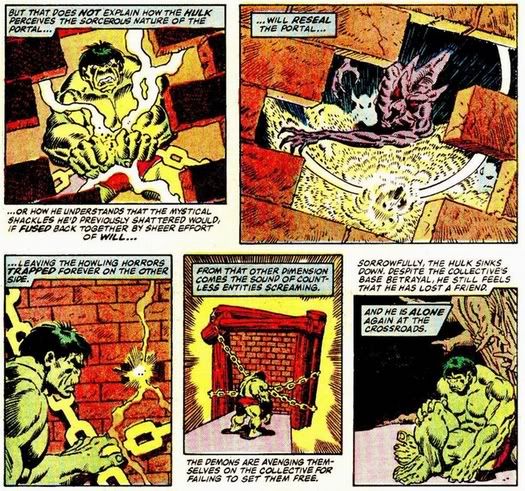
Labels:
Hulk,
Hulk Is The Strongest One There Is
Thursday, February 24, 2011
Blogging frustrations and theme weeks
I have no reviews or insights on comics to share with you today. I am struggling with the notion of meeting my pledge to provide content here every weekday for 6 months.
I do not want to stop blogging, but the more time I put into my novel the more I consider abandoning the every-weekday pledge. I doubt anyone would cry foul if I posted 4 days a week - or even 3 - instead of 5, but it would disappoint me. This coming Monday, I'll be 2 months into the 6 month goal. That feels like too deep a cut to not keep going. Mainly, I want to finish what I started; that's something I haven't done much in my life and it's no one's fault but my own. Well, okay, I guess I also blame Jesus.
The best idea I have is to write all of my reviews on the weekend and schedule them to post during the week. I'm going to try that and we'll see what happens. Doing that feels kind of weird just because I'm not used to writing more than one review on any given day. I also wonder if I'll have time for any longer, more involved pieces.
I am happy so far with one of my other goals - to write reviews of all the GNs I own before allowing myself to buy new ones. The one annoying little problem I have there is what to pick for review on any given week. The plan of writing all the reviews over the weekend makes it that much more annoying, because I have to pick them all right away. I end up changing my mind a dozen times.
So, I've decided I'm going to do theme weeks here at Superheroes, etc. There will be crime comic week, a monster comic week, weeks for particular series, weeks for specific creative teams on particular series, and I can almost guarantee you there will be several Hulk comic weeks (though, arguably, that's every week here).
I considered doing this before because I thought it would be fun, but two things got in the way. First, there would be the regular frustration of trying to fit reviews for new comics into weekly themes. Since I won't be reviewing any new GNs for a while, that's not a problem. Second, there's my Friday Hulk column. I felt that a weekly theme wouldn't feel complete if I didn't include the Hulk column, and there's no way I'm shaving off Hulk Is The Strongest One There Is. So, I'm just going to have the theme weeks and if I can fit my Hulk Fridays into the blog's respective weekly themes, great. If not, no big.
I do not want to stop blogging, but the more time I put into my novel the more I consider abandoning the every-weekday pledge. I doubt anyone would cry foul if I posted 4 days a week - or even 3 - instead of 5, but it would disappoint me. This coming Monday, I'll be 2 months into the 6 month goal. That feels like too deep a cut to not keep going. Mainly, I want to finish what I started; that's something I haven't done much in my life and it's no one's fault but my own. Well, okay, I guess I also blame Jesus.
The best idea I have is to write all of my reviews on the weekend and schedule them to post during the week. I'm going to try that and we'll see what happens. Doing that feels kind of weird just because I'm not used to writing more than one review on any given day. I also wonder if I'll have time for any longer, more involved pieces.
I am happy so far with one of my other goals - to write reviews of all the GNs I own before allowing myself to buy new ones. The one annoying little problem I have there is what to pick for review on any given week. The plan of writing all the reviews over the weekend makes it that much more annoying, because I have to pick them all right away. I end up changing my mind a dozen times.
So, I've decided I'm going to do theme weeks here at Superheroes, etc. There will be crime comic week, a monster comic week, weeks for particular series, weeks for specific creative teams on particular series, and I can almost guarantee you there will be several Hulk comic weeks (though, arguably, that's every week here).
I considered doing this before because I thought it would be fun, but two things got in the way. First, there would be the regular frustration of trying to fit reviews for new comics into weekly themes. Since I won't be reviewing any new GNs for a while, that's not a problem. Second, there's my Friday Hulk column. I felt that a weekly theme wouldn't feel complete if I didn't include the Hulk column, and there's no way I'm shaving off Hulk Is The Strongest One There Is. So, I'm just going to have the theme weeks and if I can fit my Hulk Fridays into the blog's respective weekly themes, great. If not, no big.
Labels:
Autobiographical
Wednesday, February 23, 2011
Reflection, inspiration, forgiveness, hope and a last line quoting Coldplay, sorry Kate (Kate hates Coldplay)
I took vacation last week and it accomplished exactly what I hoped. It was more than a pit stop. I turned a corner.
I didn't get as much done as I hoped, but I achieved momentum. I'm writing. I'm writing the novel that I've allowed to live lonely in my head for years. For a few nights I've added to the novel. For now my rule is I need to write at least 4 pages every day. I was delightfully surprised last night when I realized I'd finished 5 pages without meaning to go beyond my minimum. It's just a page, I know, but I've been so terrified to fail utterly at so little as a paragraph that an extra page means so much more than the time the keystrokes took.
I've grown flexible. Even if you've never tried to wrestle writer's block or anything like it, if you've ever dieted or tried to quit smoking, then you probably know the danger of being so rigid that you're self-defeating. For example, you decide to eat healthier. You're good for a few days and then you break down and shove a bag of Doritos in your face. Discouraged by your weakness while desperately seeking an excuse to stop denying yourself at the same time, you think, "Oh well, I screwed up. Eating all these Doritos messed up my diet. I guess I have to quit it entirely." I've done the same thing with writing. When I've tried to get back to a regular writing schedule, I make plans. I make ambitious and complex schedules. All it took was one cog in my spiffy new construct to not do what it was supposed to do - one day when I didn't have enough time to read or write as much as I wanted - and I huffed and puffed and just pushed the big, steaming monster off a cliff. This time, I started off mindful of overburdening myself. Already I've made plans that I've needed to scrap. But rather than scrap everything, I just scrap the plans. And then I make new ones. I accept that I don't know everything and do my best to adapt.
One of the most important things I accomplished last week was turning the idea of living as a writer from a lofty goal into a living, breathing possibility. I read and wrote all day. I researched. I learned. And sometime around Wednesday or Thursday as I drove to Albany to pick up Maryann from work, it occurred to me that I was not thinking of myself as a guy on vacation. I was thinking of myself as a writer who was working. You know the way cliché seems like nothing more than cliché until somehow it becomes viscerally real to you - until you don't just know it's true, but you fucking know it's true - and you shake your head at all the times you dismissed it? Well there's a whole host of self-helpy sayings that go along the lines of "Make your dreams reality." I felt that. It wasn't abstract. It was tangible. I saw it. I see it.
But I think I learned the most important lesson so far yesterday. Yesterday was my first day back at work and it felt good. It was relatively low stress. Then towards the end of the work day I saw the news that Dwayne McDuffie died.
I did not know McDuffie's work well though I remember being surprisingly impressed with how much he made me like Deathlok (a comic I probably would've avoided otherwise), and of course the Justice League cartoons he wrote were some of the best animated adaptations of superhero comics in years.
I was strangely affected by the response to the news. All it took was a quick scroll down my twitter feed to see that McDuffie commanded tremendous respect and love among his colleagues. Almost everyone in the long list of comics pros I follow on twitter seemed genuinely sad, shocked, and as if they'd lost something precious. It wasn't long before tribute posts appeared, listing McDuffie's accomplishments and expressing the impact he'd had on bloggers, writers, artists, and other readers.
Yesterday when I waited for Maryann to leave her office, I thought of everything I'd read about McDuffie, how much he accomplished and how young he was (his age had still not been posted but there were plenty of pictures of him on the Internet and he didn't look he could've left his 40s yet). While I did not know McDuffie and do not know his struggles, reading about his life made me want to go home and write that much more. It made me want to stay up all night and deal with the physical and mental consequences, so I could make sure that before whoever took McDuffie took me, I could be lucky. And I knew it wasn't envy for fame or respect or money that I felt. I knew that I just wanted, upon my death, for people to say I loved doing what I spent my life doing. In that way if no other, McDuffie's life seemed to have been a good one, and I wanted a good life too.
It will seem strange then when I say that I am happy that - inspired, rededicated and re-energized - the first thing I did when I got home was fire up the XBox 360 and play Borderlands for an hour.
When you want to be something and you spend so much time not doing the things you need to do to be that thing, something happens. You get angry. You get frustrated. You feel guilty for denying yourself your dreams. Those emotions do not motivate you. They freeze you. They convince you that you are worthless for not doing as much as you could. They convince you that you never wanted to be what you said you wanted to be in the first place, and that you never could have achieved it anyway. It becomes a vicious cycle and the easiest way to deal with it is simply to not deal.
Last week, when I finally built up momentum, when I started writing, when things started seeming possible, it occurred to me how many years had gone by when I could have been doing exactly what I was doing then and there. I could have built a better life for myself doing exactly what I always knew I wanted to do. I could have been making a living as a writer.
But yesterday, in spite of the momentum I made during my vacation, in spite of the inspiration of Dwayne McDuffie's example, when I got home I was just plain tired. I had a post-work rhythm and my writing plans did not fit. I got up in the morning, I went to work, I worked, I got home, and then I chilled. To go to work and then to go home to do more work felt wrong. It felt dumb. It felt like I was being mean to myself.
That's something I'll just have to deal with. I have habits that are in the way of regular writing. I need to build new ones. I'll work at it. I'll stumble and fall and get back up again. That's not the point.
The reason I'm thankful for my momentary lapse is that it taught me to do something I never thought I could do. I looked back at the many years when I did not do what I should've been doing. I acknowledged the possibility that if I had allowed myself fewer distractions, my life could be much different. I acknowledged that life is hard - mine and yours and everybody's - and that I didn't do what I should've because it was hard to do. And I forgave myself. I forgave myself for all my dumb years - dumb in more ways than one - because it really is okay. It's not over yet and, like the man sings, everything's not lost.
I didn't get as much done as I hoped, but I achieved momentum. I'm writing. I'm writing the novel that I've allowed to live lonely in my head for years. For a few nights I've added to the novel. For now my rule is I need to write at least 4 pages every day. I was delightfully surprised last night when I realized I'd finished 5 pages without meaning to go beyond my minimum. It's just a page, I know, but I've been so terrified to fail utterly at so little as a paragraph that an extra page means so much more than the time the keystrokes took.
I've grown flexible. Even if you've never tried to wrestle writer's block or anything like it, if you've ever dieted or tried to quit smoking, then you probably know the danger of being so rigid that you're self-defeating. For example, you decide to eat healthier. You're good for a few days and then you break down and shove a bag of Doritos in your face. Discouraged by your weakness while desperately seeking an excuse to stop denying yourself at the same time, you think, "Oh well, I screwed up. Eating all these Doritos messed up my diet. I guess I have to quit it entirely." I've done the same thing with writing. When I've tried to get back to a regular writing schedule, I make plans. I make ambitious and complex schedules. All it took was one cog in my spiffy new construct to not do what it was supposed to do - one day when I didn't have enough time to read or write as much as I wanted - and I huffed and puffed and just pushed the big, steaming monster off a cliff. This time, I started off mindful of overburdening myself. Already I've made plans that I've needed to scrap. But rather than scrap everything, I just scrap the plans. And then I make new ones. I accept that I don't know everything and do my best to adapt.
One of the most important things I accomplished last week was turning the idea of living as a writer from a lofty goal into a living, breathing possibility. I read and wrote all day. I researched. I learned. And sometime around Wednesday or Thursday as I drove to Albany to pick up Maryann from work, it occurred to me that I was not thinking of myself as a guy on vacation. I was thinking of myself as a writer who was working. You know the way cliché seems like nothing more than cliché until somehow it becomes viscerally real to you - until you don't just know it's true, but you fucking know it's true - and you shake your head at all the times you dismissed it? Well there's a whole host of self-helpy sayings that go along the lines of "Make your dreams reality." I felt that. It wasn't abstract. It was tangible. I saw it. I see it.
But I think I learned the most important lesson so far yesterday. Yesterday was my first day back at work and it felt good. It was relatively low stress. Then towards the end of the work day I saw the news that Dwayne McDuffie died.
I did not know McDuffie's work well though I remember being surprisingly impressed with how much he made me like Deathlok (a comic I probably would've avoided otherwise), and of course the Justice League cartoons he wrote were some of the best animated adaptations of superhero comics in years.
I was strangely affected by the response to the news. All it took was a quick scroll down my twitter feed to see that McDuffie commanded tremendous respect and love among his colleagues. Almost everyone in the long list of comics pros I follow on twitter seemed genuinely sad, shocked, and as if they'd lost something precious. It wasn't long before tribute posts appeared, listing McDuffie's accomplishments and expressing the impact he'd had on bloggers, writers, artists, and other readers.
Yesterday when I waited for Maryann to leave her office, I thought of everything I'd read about McDuffie, how much he accomplished and how young he was (his age had still not been posted but there were plenty of pictures of him on the Internet and he didn't look he could've left his 40s yet). While I did not know McDuffie and do not know his struggles, reading about his life made me want to go home and write that much more. It made me want to stay up all night and deal with the physical and mental consequences, so I could make sure that before whoever took McDuffie took me, I could be lucky. And I knew it wasn't envy for fame or respect or money that I felt. I knew that I just wanted, upon my death, for people to say I loved doing what I spent my life doing. In that way if no other, McDuffie's life seemed to have been a good one, and I wanted a good life too.
It will seem strange then when I say that I am happy that - inspired, rededicated and re-energized - the first thing I did when I got home was fire up the XBox 360 and play Borderlands for an hour.
When you want to be something and you spend so much time not doing the things you need to do to be that thing, something happens. You get angry. You get frustrated. You feel guilty for denying yourself your dreams. Those emotions do not motivate you. They freeze you. They convince you that you are worthless for not doing as much as you could. They convince you that you never wanted to be what you said you wanted to be in the first place, and that you never could have achieved it anyway. It becomes a vicious cycle and the easiest way to deal with it is simply to not deal.
Last week, when I finally built up momentum, when I started writing, when things started seeming possible, it occurred to me how many years had gone by when I could have been doing exactly what I was doing then and there. I could have built a better life for myself doing exactly what I always knew I wanted to do. I could have been making a living as a writer.
But yesterday, in spite of the momentum I made during my vacation, in spite of the inspiration of Dwayne McDuffie's example, when I got home I was just plain tired. I had a post-work rhythm and my writing plans did not fit. I got up in the morning, I went to work, I worked, I got home, and then I chilled. To go to work and then to go home to do more work felt wrong. It felt dumb. It felt like I was being mean to myself.
That's something I'll just have to deal with. I have habits that are in the way of regular writing. I need to build new ones. I'll work at it. I'll stumble and fall and get back up again. That's not the point.
The reason I'm thankful for my momentary lapse is that it taught me to do something I never thought I could do. I looked back at the many years when I did not do what I should've been doing. I acknowledged the possibility that if I had allowed myself fewer distractions, my life could be much different. I acknowledged that life is hard - mine and yours and everybody's - and that I didn't do what I should've because it was hard to do. And I forgave myself. I forgave myself for all my dumb years - dumb in more ways than one - because it really is okay. It's not over yet and, like the man sings, everything's not lost.
Labels:
Autobiographical
Tuesday, February 22, 2011
Review - Hulk Visionaries: Peter David Vol. 3
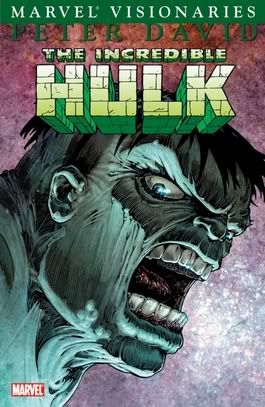 Hulk Visionaries: Peter David Vol. 3
Hulk Visionaries: Peter David Vol. 3By Peter David, Jeff Purves, Steve Englehart, Alex Saviuk, and Keith Pollard
Published By Marvel; $19.99 US
Collects Incredible Hulk #s 349-354, Web of Spider-Man #44, and Fantastic Four #320
The third Hulk Visionaries: Peter David volume is the first to focus solely on the Las Vegas period; when the gray Hulk first became known as Joe Fixit. Incredible Hulk #345, collected in the preceding Hulk Visionaries: Peter David volume, ended with the gray Hulk caught at ground zero of a gamma bomb blast courtesy of the Leader. While the world believed him dead, the Hulk surfaced in Incredible Hulk #347 in Las Vegas, apparently working as a leg-breaker/bodyguard for casino owner Michael Berengetti. He also seemed to have figured out a way to stop himself from turning back into Bruce Banner. In this third volume we find out exactly how the Hulk survived the gamma blast, how he put the cork in Banner, and witness the fallout when Banner eventually resurfaces.
The Vegas stories were popular and remain etched in readers’ memories, evidenced by the fact that – following Paul Jenkins’s example – most readers refer to the gray Hulk simply as “Fixit” these days. I collected these issues as they were released; in fact one of the two letters I’ve had printed in Incredible Hulk was one complaining about the first Hulk issue collected in this volume. Still, I think my tastes veer sharply from those of a lot of my fellow Hulk fans. I didn’t hate Hulk’s time in Vegas, but I didn’t like it much either.
The very idea of it rubbed me the wrong way. The moral implications didn’t bother me. If you’d followed David’s gray Hulk adventures this far, you were used to some serious moral flexibility. It just seemed silly. The Hulk has fought gods and giant monsters and now he was a thug in Vegas? He’d laid cities to waste and now he was a glorified bouncer?
I’m not saying it didn’t make sense. In many ways it fit the gray Hulk’s character perfectly. In fact, in my review of the preceding volume I wrote that one of the things that helped distinguish David's various interpretations of the Hulk was the notion – a notion that shouldn’t have been as innovative as it was – that the Hulk wanted to build and maintain a life of his own. The Hulk’s recruitment as a leg-breaker is a natural extension of that. It makes perfect sense that the gray Hulk would want to hide from his past and build a new life to enjoy. But as a kid reading my favorite hero’s comic, it pissed me off. It felt demeaning; like Batman becoming a traffic cop.
I went back and forth on whether or not I liked Jeff Purves’s art. Purves was Incredible Hulk’s penciler for the entire Las Vegas period and as far as I can tell, save for a few Hulk shorts he drew for Marvel Comics Presents, that was the extent of his time in comics (according to IMDB however he’s been working in movies and TV, e.g. Mulan and The Simpsons Movie). There was a bland, featureless quality to most of his faces. In the case of the Hulk himself, his face alternated between looking like that of a bulldog, an old man, or a massive turtle (or at least that’s what it made me think of – there are a few panels that always remind me of that giant turtle thing the hero talks to in The Neverending Story). At the same time, he did a lot of interesting, dynamic things with perspective – particularly during action scenes – that I really liked. I don’t know his reasons for not continuing with comics, but I’m curious what he would have produced if he’d worked on other titles.
There’s also something specific about the issues collected in this volume that I didn’t like. I used to have a name for it which I’m sure I thought was terribly clever. I don’t remember what it was, but it was something along the lines of “Hulk’s Big Dumb Neverending Crossover.”
This volume opens with Web of Spider-Man #44. During a book tour stop in Vegas, Spider-Man gets caught in the crossfire between a quartet of cyborg commandos calling themselves Warzone. When one of them injures the Hulk’s girlfriend Marlo, the gray guy gets involved, which leads into Incredible Hulk #349. Hulk fights Spidey, Spidey fights Warzone, Hulk fights Warzone, Warzone fights Warzone, and when everything’s resolved Hulk goes home to find Doctor Doom waiting for him in his apartment. That leads into Fantastic Four #320 when Doom convinces the Hulk to travel to New York City to fight the Thing for no real reason. They continue their fight in Incredible Hulk #350 and that issue ends with the Beast stopping the Hulk before he can leave NYC and blackmailing him into helping the Avengers in one of (and, if memory serves, the very first of) Marvel’s huge, dumb annuals crossovers. Thankfully, they didn’t bother reprinting Avengers Annual #17 (which ends with the Hulk betraying the other heroes and getting blasted through the ocean by the High Evolutionary and landing, very conveniently, in the Nevada desert). I know crossover stories happen, and occasionally they can be very fun, but at the time I remember having three Hulk crossover issues in a row - particularly when neither of the three issues had anything to do with one another - was a little extreme. Thankfully, David wrote the Web of Spider-Man issue, but Englehart’s Fantastic Four issue really didn’t make much sense to me (and yes, for reasons other than Hulk getting beat up by Thing). Walter Simonson wrote the Avengers annual and it wasn’t particularly bad, but the Hulk didn’t really seem to have a reason to be in the story other than to sell a few extra comics. These days Marvel seems to have gone more crossover crazy than ever, but back then this seemed a little excessive.
Unfortunately, I have to admit the only part of this volume I really enjoy are “Total Recall” and “Fervor” – Incredible Hulk #s 351 & 352 respectively – which tell the tale of how Hulk survived the gamma bomb blast and how he (all too temporarily) suppressed the change back to Banner. We learn that wizards on K’ai, the homeworld of the Hulk’s late lover Jarella, had been monitoring the Hulk’s activities on Earth. When they saw the Hulk was about to be killed by the Leader, they teleported him to K’ai. They tell the Hulk that during his absence a Hulk-worshipping religion has emerged with a particularly vicious zealot at its head. It had been a long time since the Hulk had gone on any kind of crazy alien/cosmic/interdimensional adventures, and getting a new world-hopping Hulk tale was refreshing. I even liked Purves’s art better in handling the otherworldliness of K’ai as opposed to the more real-world Las Vegas. Re-reading these stories for the review has strengthened an opinion that has been percolating with me for a while – that the Hulk is his best when he’s off Earth and that his adventures should take him the hell away from Earth as much as possible.
For an admirer of Peter David’s Incredible Hulk, the collection is essential and as such a fan I wouldn’t want to be without it. It just wasn’t my favorite time in the green-sometimes-gray goliath’s history.
Labels:
Graphic Novel/Comic Book Reviews,
Hulk
Monday, February 21, 2011
Review - Orc Stain Vol. 1
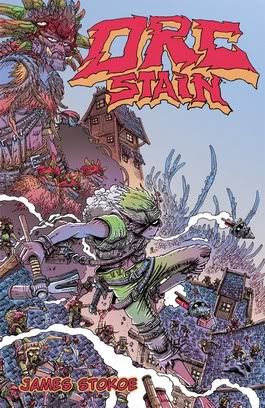 Orc Stain Vol. 1
Orc Stain Vol. 1By James Stokoe
Published By Image; $17.99 US
Collects Orc Stain #s 1-5
As unlikely as it may seem for a comic book blogger to have enjoyed teenage years that were anything other than a rock ‘n’ roll fable, the better part of my 15th and 16th years’ Friday nights were spent playing Dungeons & Dragons at the Studio of Bridge & Games in Schenectady. Our group enjoyed a number of truly corny inside jokes. When our adventurers traveled in the wilderness and our dungeonmaster Ren announced “Night falls,” we would make a communal “THUMP” noise. Our characters would camp, occasionally there’d be a quick dust-up in the night with wandering goblins or something along those lines, and eventually Ren would announce “Dawn breaks!” We all celebrated this by collectively making a sound like glass shattering.
And believe it or not, I'm fairly certain at least one guy in our group had lost his virginity at this point. No, I have no idea how, I just heard it might have happened.
One of our favorite weekly rituals was a short song we always found an excuse to sing, no matter what was going on in the game. I don’t know where it came from – if someone in the group came up with it or if it was something that had floated in from another game – but we called it the Orc Marching Song:
Kill,
Pillage and burn!
We’re gonna rape, kill, pillage and burn!
Eat babies!
We’re gonna rape,
Rape,
Rape and rape !
We’re gonna rape, rape, rape and rape!
Make babies!
Okay, writing that out makes it seem more offensive than I thought it was at the time.
I couldn’t keep that song out of my head as I read James Stokoe’s first Orc Stain trade collection, and I guess that makes sense. In his afterword, Stokoe explains Orc Stain was conceived after an argument he had with a friend about the orcs of Lord of the Rings. Stokoe writes, “I was under the impression that you didn’t get a reasonable explanation as to why the orcs were so utterly evil and amoral. They just were and the plot went on.”
Stokoe’s response was to create the wildly colorful and deliciousy brutal world of Orc Stain: a world that makes sense of the orcs and where no one but orcs make sense. It’s a world where living things take on the roles of inanimate objects – like a massive bear-like creature with a safe carved out of his belly; a battle axe with eyes whose beak acts as the blade; or a hot-air balloon held in place by a massive, veined stalk that looks suspiciously gronch-like (gronch = orc dick) – and so accomplishing mundane tasks necessitate the torture and slaughter of innocent beasts. The orc economy is literally dependent on violence as the orc currency – coins called chits – are made from diced up orc genitalia (in fact Stokoe provides a disturbing guide on how to make chits from orc cock in the back).
Like the masses of nameless orcs in Lord of the Rings and other fantasy series, the other orcs of Orc Stain are born without names to differentiate themselves. The most noteworthy orcs are given numbers after they die which are carved into massive totems in the shapes of their heads. Orcs do tend to earn names by reputation, and Orc Stain opens with one such bastard, The Orctzar, whose influence spreads as he conquers more lands and unites more orcs under one banner than any other chieftain in history. Like any orc, he just wants more, and a seer tells him to accomplish this he needs the “one-eyed orc.”
Enter One-Eye, an orc with the uncanny ability – like Thor, and yet very much not like Thor – to accomplish just about anything with the stroke of hammer. A safecracker by trade, One-Eye can hit a structure in just the right spot to bring it crashing down around his enemies’ ears or he can tap an orc in just the right vein to make his limbs pop off. Though he’s no angel, One-Eye isn’t as ruthless a bastard as most of his orc brethren. He steals and he kills and he maims, but mostly for necessity or vengeance rather than the pure sadism that drives his fellow orcs. One-Eye doesn’t know why some particularly menacing orcs from the southern jungles are hunting him and rounding up every one-eyed orc they can find, but he's eventually captured about brought to a city built around a Godzilla-sized, spider-like beast dug out of the side of a mountain.
It’s a darkly humorous fantasy adventure, and the star here is Stokoe’s art. I’m kind of at a loss to describe it. It puts me in mind of some of the more fantasy-flavored psychedelic rock album covers, but darker in content; like if a Grateful Dead poster had a nightmare. It’s amazing stuff, and rather than trying and failing to describe it any more precisely, I’d advise you to just run a Google Image search on “Orc Stain” (but if you do, no BS, in most likelihood you will buy the trade – consider yourself warned).
If there’s any weakness to Orc Stain Vol. 1, it’s that the ending doesn’t necessarily feel like the ending of a storyline, but I don’t count that as a fault. Orc Stain is meant to be read issue-by-issue. Stokoe isn’t writing “for the trade.” And that’s fine by me. If I could afford to pick up single issues, Orc Stain would be at the top of my pull list. Though the trade certainly doesn’t suck, as evidenced by how quickly Amazon ran out of copies almost as soon as the collection was released.
A while back I made the pledge to review every single trade in my collection before allowing myself to buy another. Orc Stain is both one of the reasons why I want to race like mad to finish reviewing all my trades and one of the things that may tempt me to break that pledge; if I do break the pledge, there’s a damn good chance it will be the release of Orc Stain’s second volume that makes me do it.
Labels:
Graphic Novel/Comic Book Reviews
Friday, February 18, 2011
HULK IS THE STRONGEST ONE THERE IS!!!!!! : 15 Memorable Hulk vs. Superhero brawls, and some Hulk/Zeus preamble

So apparently, a lot of Hulk fans were a little unhappy after the release of Incredible Hulks #622. I couldn't imagine why.
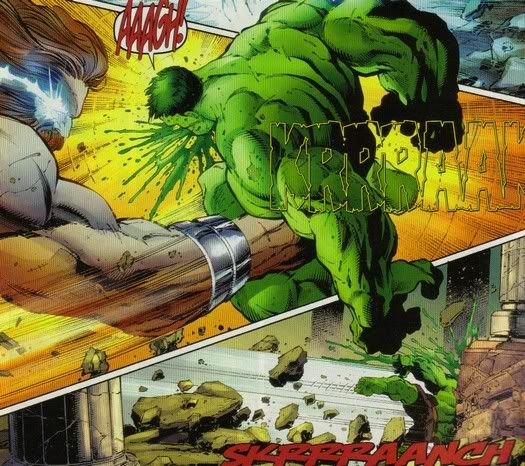
I'm not going to go on too long about this, but I do want to say a couple of things.
First, I'm a Hulk fan. I have been ever since I started reading comics. I can relate to the urge to get angry when our favorite green guy is laid low. But to be honest I have a difficult time getting angry about this. It would be different if we were talking about a less powerful hero or villain, but this is Zeus. Not just a god, but a ruler of gods. The kind of guy that people like Eternity and the Living Tribunal ring up when they need a hand. I'm not going to get too angry about Hulk losing to him. No, we shouldn't petition for Joe Casey's return to the title because you never know when a local zoo will have a prison break, but I don't think this is exactly the same thing.
Second, I can't tell anyone else how to read comics or why or what to like. I can say from experience that if you allow the question of whether or not your favorite hero wins a fight govern whether or not you are going to enjoy comics, occasionally you are going to be very disappointed.
Third and finally, the funny thing is I've really been hating Incredible Hulks and yet this Zeus/Hulk thing has nothing to do with it other than the fact that the whole point of "God Smash" escapes me. I liked the allusions to Incredible Hulk: The End vis-a-vis Hulk-as-Prometheus, but that was about all I liked.
And while I could go on for a while about what I haven't liked about Incredible Hulks, I'll settle for asking...Greg, do we really need all this goddamn Hulk puke?

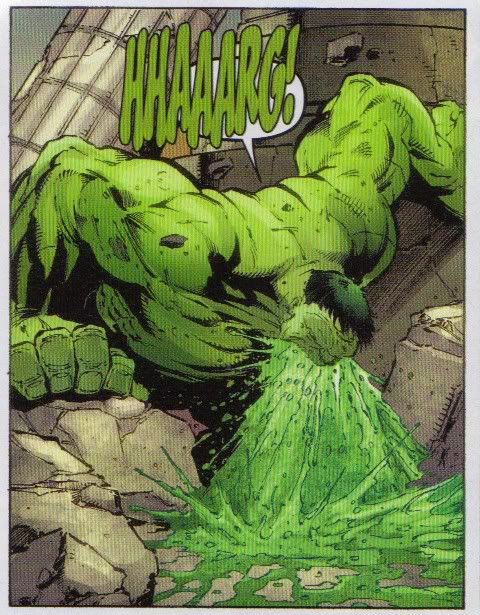
Get some Hulk Dramamine or something dude. It's freaking gross.
Regardless, since so many of us are upset about Hulk getting too many lightning bolts to the face, I thought I'd try to apply a band-aid with a little nostalgic look back to Hulk brawls I find memorable. At the end of January I posted a list of memorable super brawls and I tried very hard to not stack the thing with Hulk fights. Now's my chance to give the green guy his due. Specifically, I've chosen fights when the Hulk has battled other superheroes because, well, why not?
These are not all necessarily memorable because they were big, explosive fistfights. Some are memorable because of the story, or simply because of what was going through my head at the time. And they aren't ranked in any kind of order of preference.
--Hulk and the Warbound vs. the Avengers and Fantastic Four in World War Hulk #2 by Greg Pak and John Romita, Jr.
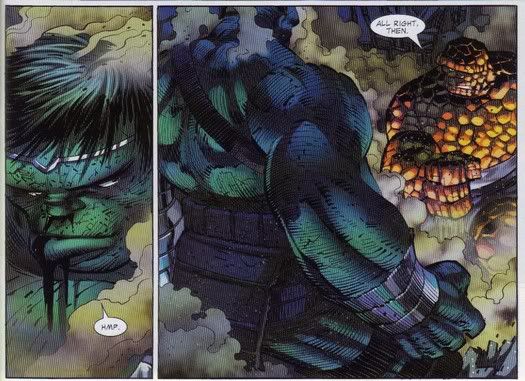
World War Hulk #2 was my favorite issue of the mini. If you're looking for an innovative story, World War Hulk isn't going to be what quenches your thirst, but the battle in this issue was expertly choreographed by Greg Pak and John Romita, Jr. What I loved the most were the perfect little character moments in the middle of the battle, like this interesting little grunting communication between the Hulk and the Thing. Something close to camaraderie passes between Hulk and Ben Grimm here. I think out of all the heroes Hulk tears through in the series, Ben Grimm is the only one who still commands at least some of his respect. After all, he isn't one of the four Illuminati members he's returned to Earth to take vengeance upon, and unlike the Avengers Grimm dares to take Hulk on one-on-one. And of course, Grimm has a long history of playing underdog against the Hulk. It gives me the impression that this is the only moment in all of World War Hulk in which the Hulk genuinely enjoys himself a little bit. He's so revenge-minded throughout most of it that you don't get the sense he's really reveling in any of it; he's just gone wild.
--Hulk vs. Thor in Thor #385 by Jim Shooter, Stan Lee and Erik Larsen
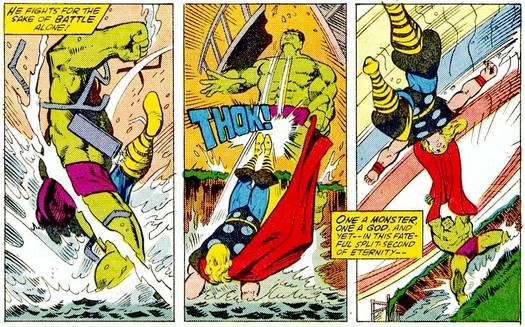
Just like my first example, I mentioned Thor #385 in that January 27th 10 Memorable Super Brawls post, but both HAD to be listed here too (which is why I'm getting them out of the way up front).
Other than to note that I was surprised to be reminded that it was actually Erik Larsen who drew this comic, I'll just paste in what I wrote for my January 27th post:
I haven't browsed enough comic solicits lately to know whether or not they still do it, but the phrase "cover-to-cover battle" used to be bandied about quite a bit, but you knew it wasn't completely true. No matter how heavy the fighting was, you'd always have at least a page or two of exposition.
In that respect, Thor #385 is no different, but it's just about as close to a true cover-to-cover battle as a Marvel comic ever got. The Hulk/Thor rivalry is as old as Marvel's superhero kingdom, but it's safe to say this is the most brutal battle between them. The Hulk is depicted as particularly vicious, at one point threatening to kill a woman if Thor won't relinquish his hammer. If I recall correctly, Stan Lee meant for this to be the so-called "mindless" Hulk, but either didn't know or didn't care that the mindless Hulk was basically just a dumb animal who didn't even have the low-bar "Hulk Smash" speech capacity. Instead he just wrote the classic "Hulk Smash" Hulk, just as more of a bastard.
It was written as a fill-in, but to anyone who's ever cared either way about the Hulk/Thor rivalry, it's required reading.
--Hulk vs. Superman in Incredible Hulk Vs. Superman by Roger Stern and Steve Rude
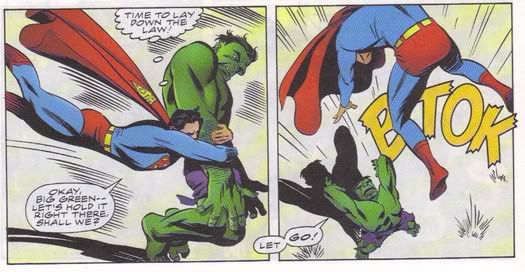
Incredible Hulk Vs. Superman is easily my favorite of the Marvel/DC crossovers. Rather than simply building a story to facilitate a clash from different companies' heroes, the creative team of Incredible Hulk Vs. Superman had a lot of fun with it, writing a retrospective story set in the Silver Age, letting characters like Betty Ross, Lois Lane, Rick Jones and Lex Luthor mingle with each other back when Lex still had a little hair left and the Hulk's identity was still a secret one.
Hulk and Superman do trade blows, a couple of times actually, but you're not going to get any kind of knock-down, bloody fist brawl to prove which one is better. It's just a fun comic celebrating the heyday of superheroes.
--Hulk vs. Captain America and Doc Samson in Incredible Hulk #406 by Peter David and Gary Frank
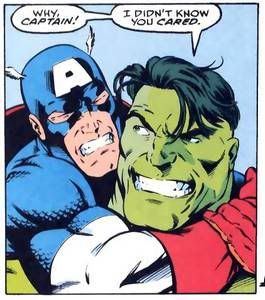 This wasn't a particularly huge brawl, but I include it because it's an example of when the story behind the fight had me rooting for the Hulk harder than ever.
This wasn't a particularly huge brawl, but I include it because it's an example of when the story behind the fight had me rooting for the Hulk harder than ever.This was a fight over Marlo, Rick Jones's girlfriend (later his wife, I don't remember whether or not they were engaged at this point). Marlo had been killed 9 or 10 issues previous by a crazy woman posing as Rick's long lost mother. The Leader attempted to resurrect Marlo with his servant Soul Man, but the Hulk interrupted the process. The result was a living but catatonic Marlo.
But Rick refused to give up on her, even when Marlo's brothers showed up demanding to take her back to her family. Knowing about Rick's connections with the Hulk, the cops call Captain America for help. Cap tries to talk Rick down, but when the Hulk shows up things get punchy pretty quick. Doc Samson shows up later and both he and Cap try futilely to put a dent in Hulk while Rick fights off the cops and Marlo's brothers.
As a Hulk fan it was gratifying first because Rick chooses Hulk over Cap, as opposed to the choice he made long ago that sparked another battle on this list. And in the end, when Marlo finally wakes up, the Hulk actually turns out to be on the right side of the battle. Finally, of course, there's the simple fact that Marlo does wake up. Peter David had gotten me used to her and I wasn't happy when she died. Having her return was a nice victory.
--Hulk vs. Everyone and Your Mom in Incredible Hulk #300 by Bill Mantlo, Sal Buscema and Gerry Talaoc
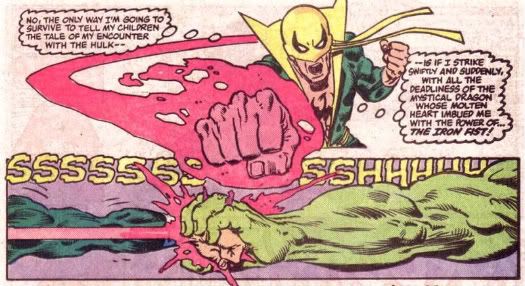
Okay, well quite not Your Mom, but a lot of people. The NYPD, S.H.I.E.L.D., Human Torch, Power Man, Iron Fist and the Avengers all try and fail to stop the Hulk's rampage. The Hulk's deadly progress through New York City isn't brought to a halt until Doctor Strange shows up and banishes the Hulk to a funky interdimensional crossroads for a year.
Doctor Strange can be a real asshole.
Forgive the tangent, but in all seriousness I was a little ticked off with the Hulk forgiving Doctor Strange at the end of the Chaos War arc. Why forgive him? First of all, why is the Hulk forgiving Doctor Strange even a narrative priority? Are they rooming together? Second, exactly what the hell did Doctor Strange do to earn forgiveness? He turned into a demon and attacked the Hulk at a pretty inopportune moment. I don't think my first thought would be to reconcile. No, it may not have been Strange's fault that he was used that way, but still I don't see how Strange's possession by a demon plucked at the Hulk's heartstrings.
--Hulk vs. Doc Samson in Incredible Hulk #319 by John Byrne
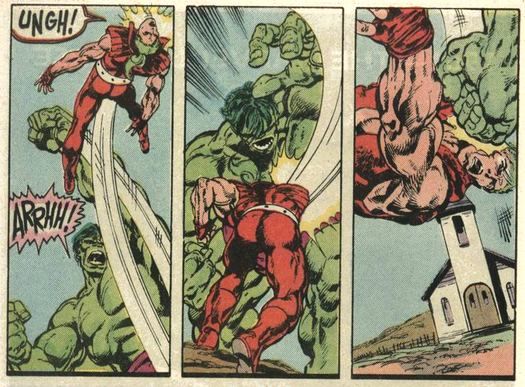
I'm specifying Incredible Hulk #319, but really I kind of see the conflict between Samson and Hulk as something that stretches across Byrne's entire first arc. Samson never hounded Hulk as much as he did in Byrne's first run, and his pursuit resulted in some beautiful fight scenes. I just wish they didn't include a version of the Hulk that was basically just a big, dumb monkey.
--Hulk vs. the Maestro in Incredible Hulk: Future Imperfect #2 by Peter David and George Perez
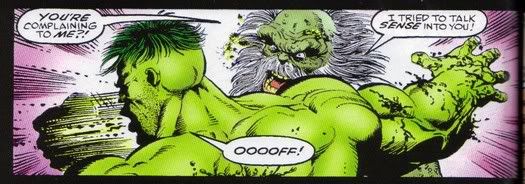
The build up to the first meeting between the Hulk and his tyrannical future self was done so wonderfully that for me this may have been the single most anticipated Hulk battle of all time.
And, you know, keeping the whole Hulk vs. Zeus disappointment in mind, any Hulk/Maestro battle is good for Hulk pride. No matter who loses, the Hulk wins. It's perfect.
--The "Ultimate" versions of Hulk and Wolverine fighting in Ultimate Wolverine Vs. Hulk by Damen Lindelof and Lenil Franics Yu
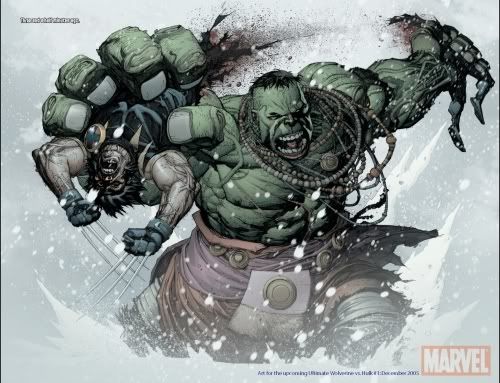
Just look at it. Let's not even say much. Just look at it. Picture it in your mind. Breathe in. Breathe out. Feel the joy spread to your toes.
--Hulk vs. the Avengers and Fantastic Four in Fantastic Four #s 25-26 by Stan Lee and Jack Kirby
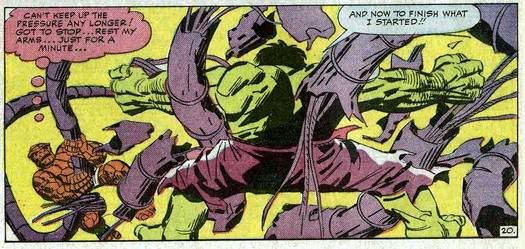
A wonderful couple of comics for so many reasons. A huge, Kirby-rendered battle. The first honest-to-Hulk tussle between the Hulk and the Thing. And, I think it may be safe to say this is the first story to punctuate just how dominant the Hulk was among the other heroes as far as pure power was concerned. He does very well against both teams, though part of this is due in no small part to some great, goofy scenes highlighting how badly the FF and Avengers are at working together; like Mister Fantastic accidentally lassoing Iron Man and, my personal favorite, Thor missing the Hulk and instead clocking Ben Grimm with mjolnir.
If I'm ever rich I'm going to hire someone to build a massive diorama reproducing the cover of Fantastic Four #26.
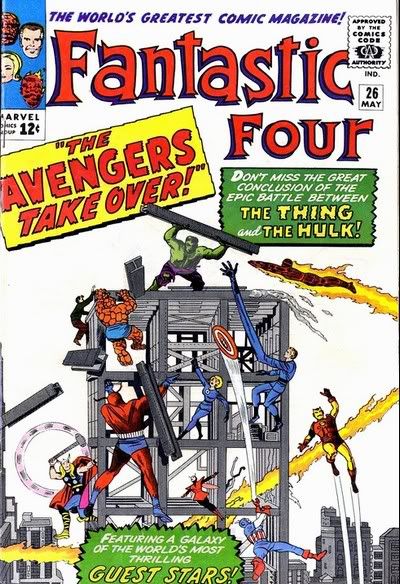
--Hulk vs. Daredevil in Daredevil #163 by Roger McKenzie and Frank Miller
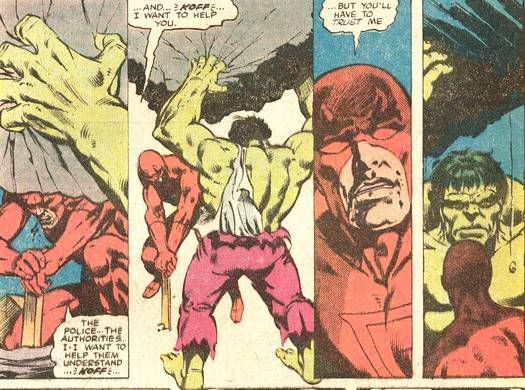
I'm surprised Daredevil #163 isn't more well-remembered, at least in Hulk comics. I can't remember a single example of a story referencing this great issue which, I have been told by other fans, was written as a tribute to the classic Daredevil/Namor battle of Daredevil #7.
Daredevil, as you can probably guess, doesn't have a snowball's chance in this fight but he still gives it everything he's got. What's even more impressive is that even as he's on the verge of collapse, Daredevil seems more concerned with Hulk's tragic life than his own. It's a great story and I remember when I first read it I desperately wanted for Banner and Murdock to become friends.
--Hulk vs. Thor in Defenders #10 by Steve Englehart and Sal Buscema
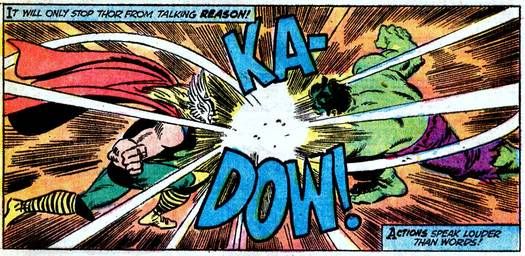
Hulk and Thor end the Avengers/Defenders War by hitting each other a lot and destroying a significant amount of property. Whenever you look at a list of Defenders comics in a price guide, you always hit a spike at #10. This is why. 'Nuff said.
--Hulk vs. Namor in Defenders #52 by David Kraft and Keith Giffen
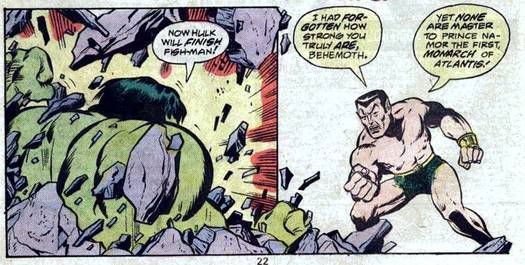
Hulk and Namor cause millions in property damage, pretty much because Namor was a little rude to Hulk. Easily my favorite tussle between Hulk and Subby, in part because of its goofy beginnings.
--Hulk vs. Thing in Fantastic Four #320 by Steve Englehart and Keith Pollard and Incredible Hulk #350 by Peter David and Jeff Purves
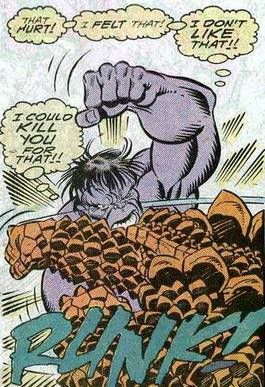 Ugh. Talk about bad memories. See, this is why I can hardly get angry for Zeus beating up Hulk. I remember when they let silly-ass Ben Grimm knock him out.
Ugh. Talk about bad memories. See, this is why I can hardly get angry for Zeus beating up Hulk. I remember when they let silly-ass Ben Grimm knock him out.I don't think I have ever been more upset with a single comic as I was with Fantastic Four #320. When the story continued in Incredible Hulk #350 there was some degree of vindication, but I didn't forget the humiliation I felt at Hulk's defeat in the earlier issue. If I remember correctly I was in eighth or ninth grade when this came out, and I was so angry I wrote my first piece of fan fiction with, you guessed it, a brawl between the Hulk and the Thing with the Hulk winning this time.
After reading the story, I went on and on with anyone who would listen about how dumb the story was, and how many flaws there were. Of course, in the end I had to admit I was just angry that Hulk lost the fight, but the truth is that the story was pretty dumb. It begins with Doom wanting to forge an alliance with Hulk, a plot point that goes absolutely nowhere. The arrangement is briefly referenced in an "Acts of Vengeance" issue of Incredible Hulk and that's it. What was particularly silly is how the Hulk approached the fight. This was the gray Hulk, who was known for his craftiness. And it was during a very specific period in which the gray Hulk was able to stop himself from turning back to Banner, but he was much weaker during the day. So this craftier Hulk attacks the Thing, who he knows has been amped up recently, in broad daylight. Why? Makes no sense. It makes no sense how he did it, and it makes no sense that he did it.
Yes, yes, I am a sore loser. Screw you.
--Hulk vs. Alpha Flight in Alpha Flight #29 by Bill Mantlo, Mike Mignola, and Gerry Talaoc
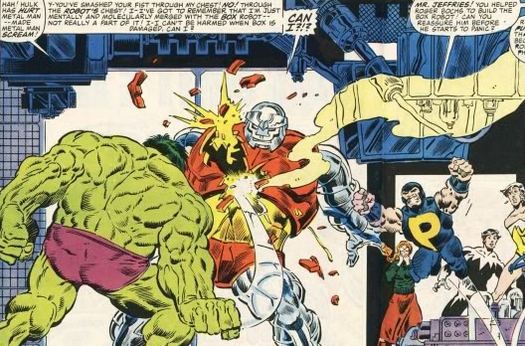
One of these days, I'm going to have to write a piece on the Crossroads Saga.
But for now, suffice to say the Crossroads Saga was a year long storyline that was a result of Doctor Strange's banishing the Hulk to an interdimensional crossroads. I was a young boy when I read these issues, and while now they aren't particularly affecting, at the time they were some of the darkest, bleakest stuff I'd ever read.
When Strange sent Hulk away, he was responsible enough to not want to put him on a world that couldn't handle him. So the worlds connected to the Crossroads were all worlds with creatures with physical and/or technological power comparable to that of the Hulk. So a mute, often pathetic, Hulk spent over a year wandering around alien worlds, getting his ass kicked, suffering betrayal at the hands of the villain with the less-than-intimidating name The Puffball Collective, and almost always losing what friends he was able to make to some kind of horrific death.
His escape came when Alpha Flight went looking for a mindless host for Walter Langkowski's spirit. With a little help from the Beyonder, they unknowingly reeled the Hulk back to Earth, and when they did he tore them a new one like you've never seen.
I felt bad for the Canadians. After all, they did Hulk a favor whether or not they meant to, but at the same time I cheered hard for the Hulk. After over a year getting beaten up by red-skinned school children and demons and sentient spinal chords, the Hulk got to beat up a bunch of people in funny underwear and it felt good.
--Hulk vs. the Hulkbusters, Doc Samson, West Coast Avengers, East Coast Avengers, and She-Hulk in Incredible Hulk #s 320-322 by Al Milgrom
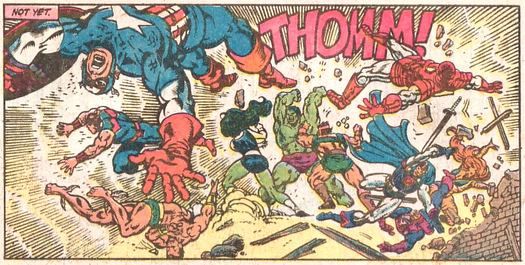
Easily the longest Hulk battle, this fight was during the era of the so-called Mindless Hulk who was physically separated from Bruce Banner. He was more powerful than the Hulk had ever been, but at the same time so brainless he couldn't even come up with stuff like "Hulk Smash" anymore.
In part, this story came about because of an earlier John Byrne slugfest. Iron Man, Hercules, Namor and Wonder Man all try to take down the Hulk. When Doc Samson convinces them that it would be safer to let him tackle the Hulk alone, Iron Man tells Samson that if he doesn't manage things quickly he'll be bringing the full complement of Avengers back to do the job. In Incredible Hulk #321, after the Hulk has beaten the Hulkbusters one more time and is tearing through Jericho, New Mexico thrashing Doc Samson's near-dead body into anything he can see, Iron Man proves true to his word. The Avengers finally prevail in the following issue, though it's made clear this is only because the Hulk is growing weaker due to his separation with Banner.
It's not the best story in the world, but it's a massive battle, and it's fun to flip through every now and then.
I hope this trip down memory lane has helped raise the spirits of my fellow Hulk fans. If not, then what can I tell you? I look forward to the hate mail.
Labels:
Hulk,
Hulk Is The Strongest One There Is
Thursday, February 17, 2011
Review - Namor: The First Mutant - Curse of the Mutants
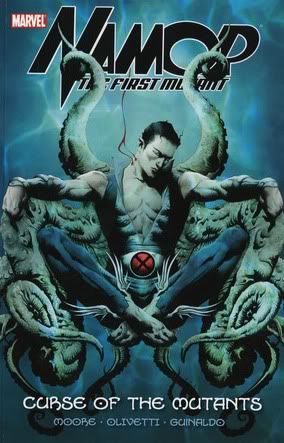 Namor: The First Mutant - Curse of the Mutants
Namor: The First Mutant - Curse of the MutantsBy Stuart Moore, Ariel Olivetti, and Andres Guinaldo
Published By Marvel; $14.99 US
Collects Namor: The First Mutant #s 1-4
I'm always quietly excited when a new Namor project rears its head. As I said when I wrote about super-heroes I wish I like more than I do, I've always liked Namor but think most Marvel writers stubbornly refuse to tap the character's potential. Every time he gets a new series, I figure that's one more chance for someone to get it right. So when I picked up the Namor Visionaries trade at the comic shop and spotted the first collection for the new Namor: The First Mutant series, after a few minutes of inner debate about how I could spend the money on something I knew would be better and wasn't I trying to spend less money on non-essentials anyway and didn't Gary Miller say on twitter he heard it was crap, I gave in and bought Namor: The First Mutant - Curse of the Mutants.
I'm a little murky on the details because I didn't know about this event before I bought the trade, but "Curse of the Mutants" is a crossover apparently beginning with Dracula's assassination at the hands of his son Xarus. Xarus sends his hordes of vampires to attack San Francisco and the nearby Utopia, home of the X-Men. The X-Men believe the best way to stop Xarus is to resurrect Dracula so he can spank his little boy but good, so Namor makes it his quest to retrieve Dracula's head from the bottom of the ocean. Before he can do so however, he will have to face throngs of Aqueos - aquatic vampires - and a vamped out character from Namor's past.
Stuart Moore's Namor is the arrogant, insufferable dick that the character's mistreatment has made him for years. In fact, the very first 3 pages of the trade have 2 purposes: exposition introducing the history of the Aqueos and displaying just what an asshole this version of Namor really is. After a shriveled, old, one-eyed atlantean woman tells Namor of the Aqueos, he gives her a how-dare-you stare after she touches his chest and barks at her for wasting his time. I find it particularly annoying not only that the interpretation of Namor as a giant prick endures, but that in the the first scene of the first issue of his new ongoing series, it's this trait that Moore chooses to highlight as Namor's defining quality. What's worse is that Moore doesn't seem very consistent with Namor's character. I get the notion that Moore was aware of how unlikable Namor might be and so he occasionally injects some lighthearted humor that just doesn't ring true.
The story is weak and in part it's doomed before it begins. Maybe this is too broad a statement and if so feel free to call me out, but I don't remember any ongoing series beginning, from the very first issue, as part of a crossover event and enjoying any kind of enduring success. It seems to me, whether or not you make a series part of a cooperative universe or not, it needs time to breathe. It needs time to carve out its own space before it gets thrown into the world wars and the civil wars and the secret wars. Part of why I didn't care about the story in this trade is that I came into it in the middle. I didn't read any of the related X-Men stories and stupidly thought that buying the collection that begins with the first issue of the series would get me in on the ground floor.
Frankly even if the story wasn't weak and wasn't mired in Marvel's crossover insanity, the art would kill it. A character like Namor offers a unique setting that will either be a book's downfall or something than can help it stand out from the rest. Ariel Olivetti unfortunately chooses the former. The underwater kingdom of Namor: The First Mutant is a boring place. There's empty blue space and empty black space and empty blue space and on and on. And hey, maybe that's actually what the ocean would look like, particularly to non-super human eyes, but this is a comic book. If you're going to sell me an aquatic superhero, I want an ocean that excites my senses. I want an ocean just as fantastic and wondrous as Oz or Middle Earth. I get the sense that Olivetti didn't draw a single piece of landscape (waterscape?) or a single fish or any single detail that he wasn't specifically told to draw. There's nothing about this ocean world to just make me believe in it or enjoy reading a comic about it. And his action sequences come off as very stiff and unappealing. He's replaced by Andres Guinaldo in the fourth issue whose art just doesn't seem to reach a professional caliber. I can't help but wonder if, for whatever reason, the production schedule on these first issues of Namor: The First Mutant was uncharacteristically tight.
Unless you're an X-Men or Namor completist, I can't think of a single good reason to recommend this trade. It's bad, really bad, and the series won't last long.
Labels:
Graphic Novel/Comic Book Reviews
Wednesday, February 16, 2011
Review - Thor Vs. Seth, the Serpent God
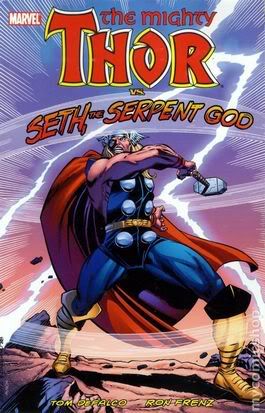 Thor Vs. Seth, the Serpent God
Thor Vs. Seth, the Serpent GodBy Tom Defalco and Ron Frenz
Published By Marvel; $19.99 US
Collects Thor #s 395-400
I can't say I remember what attracted me to the issues collected in Thor Vs. Seth, the Serpent God as I was rarely a regular collector of Thor, but I did pick them up when they first came out on the stands. It may have been because the Black Knight appeared on one of the covers and I wondered about a possible connection to what was going on in Avengers at the time (if memory serves, this storyline came out around the same time as a temporary disbanding of the Avengers). I may have been curious about the Egyptian-themed Earth Force on the cover of Thor #395. It may have been the picture of Daredevil battling Hogun the Grim on the cover of the slightly earlier Thor #393; the pairing seems so mismatched that maybe I had to pick it up just to figure out what those two had to argue about. It may have been that I just noticed the issue numbers were creeping towards 400, which meant some big double-sized issue full of revelations and epic battles was on its way and I needed to get in as close to the ground floor as possible. Or maybe, like the bored girlfriend of the football captain flirting with a computer nerd, I was tired of of reading nothing but Incredible Hulk and wanted to check out some of the guys he liked to smack around.
And while this may be starting to seem like an annoyingly recurrent theme, not unlike my surprise about the Namor collection I reviewed yesterday, I had no idea these issues were being collected until I walked into the comic shop and recognized the cover from Thor #400. I really had no choice once I saw it, flipped it open, and confirmed it was the same story I thought it was: I had to buy it. It certainly wasn't a storyline I ever found myself pining over. As I said, I've never been a regular Thor reader. But it was one of those stories that would occasionally pop up in my head and I'd think, "Yeah, they should put that in a trade," but I never thought they would. I don't generally look at sales numbers, but I've never had the impression that Thor was a big seller. Not to mention that when I watch a behind-the-scenes feature for the Incredible Hulk movie and the creator they interview is Jeph Loeb, the Glen Gary Glen Ross line "You've got the memory of a fuckin' fly" comes to define, for me, Marvel's approach to its rich history, and I tend to doubt anyone at Marvel would even remember a story like this much less think to reprint it. But obviously I was wrong, and no doubt the imminent movie and a (what seems to me at least) big push by Marvel to reprint its late '80s/early '90s stuff, designed to wrench the aforementioned I-have-no-choice-I-have-to-buy-it response from readers my age helped refresh Marvel's memory.
Thor Vs. Seth, the Serpent God is the kind of big, sprawling war of the gods that Thor is so well-suited for. Having stolen the power of the other gods in his particular pantheon, the death god Seth has his sights aimed for Asgard. With the rainbow bridge between Asgard and Earth severed, Thor cannot easily return to his homeland. Seth throws his armies against Asgard while putting plans into motion on Earth to make sure Thor cannot return to aid in its defense. He bestows two men and a woman near death with super powers and lies to them, telling them Hogun the Grim (who journeyed to Earth to tell Thor of Seth's invasion) must die or else Earth is doomed. The Egyptian-themed Earth Force battle Thor but eventually realize they've been duped. Once they figure out a way to leave Earth, the ragtag group of Thor, Hogun the Grim, the Earth Force, and the Black Knight storm the battlements of Seth's dimension and tear through his green hordes of snake-headed soldiers (and it's really tough to not think of G.I. Joe's villains while you read this, by the way).
I'm not sure why but I find the group that accompanies Thor into Seth's dimension so appealing precisely because it's such a ragtag, unlikely team. It wouldn't be as fun if Thor had just, for example, brought the Avengers or the FF along with him.
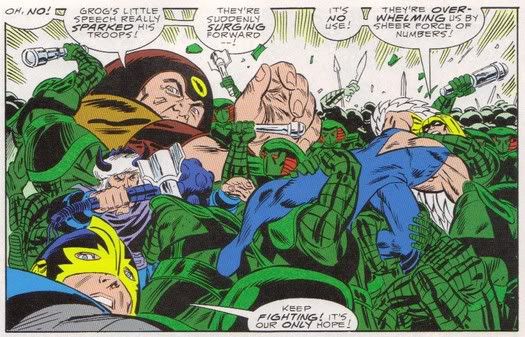
Unfortunately for everyone involved, Thor and his group are out of contact with Balder the Brave, the Lady Sif, the remaining Warriors Three, and the other defenders of Asgard. With no other recourse left to him, Balder recalls the power of Thor he desperately needs to protect his home. Thor is left with only a fraction of his super strength and none of his hammer's legendary powers. Defeat still seems nearly certain for Asgard, in spite of Balder's increased power and the surprise appearance of Leir and his Celtic pantheon of gods who were introduced a year earlier in Thor #386 (and refreshingly, wear hardly any green at all) to aid in fighting back Seth's hordes. Practically every figure of Thor's mythos throws himself against Seth: Heimdall, Loki, the Enchantress, Karnilla, the trolls, the giants, and more. Eventually, and I'm pretty sure this is legally required for any Thor storyline deemed important enough to the character's history, Surtur gets involved and he and an Odin-ified Thor battle while flashing through some of the more fantastical Marvel-specific landscapes like Namor's Atlantis and the Inhumans' home on the Moon.
When these books first came out I don't think I had a particularly good idea of who Jack Kirby was, why he was important, and I certainly didn't recognize how Tom Defalco and Ron Frenz were paying tribute to older stories in both words and images. Sure, the dialogue style was a bit dated but Thor with its Thees and Thous and Thys always seemed a little more old fashioned than other superhero comics. I think I recognized that Frenz was reaching back to an older style, but "older" was all I knew about it. Reading Thor Vs. Seth, the Serpent God with slightly more educated eyes is interesting, and it makes me hungry to hunt down as many Kirby books as I can.
Thor Vs. Seth, the Serpent God is a fun war epic and from start to finish it feels like an instruction manual on how to do a great Thor story. While you read it, it feels like it's the last, greatest Asgard war story even though you know there's no way that's the case. In particular, I found it refreshing that it was so packed with action and drama that unlike a lot of more recent superhero trades, I couldn't get through it in one sitting even though it only reprints 6 issues. Or at least, I didn't want to. It's not that it gets tedious; far from it. But Defalco and Frenz deliver enough per issue that you're content to put it down. The book will last for a while. If you love Thor, or beautiful fantasy battle scenes, or evil villains with arms in suggestive shapes that I've been mature enough to not make a joke about until now, go buy it.
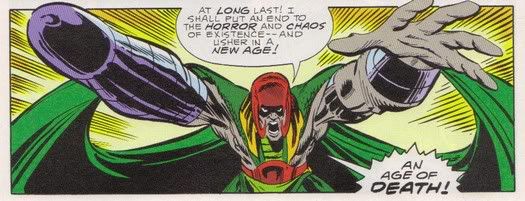
Labels:
Graphic Novel/Comic Book Reviews
Tuesday, February 15, 2011
Review - Namor Visionaries: John Byrne Vol. 1
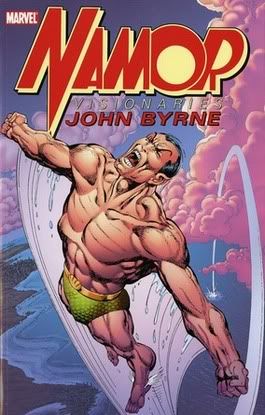 Namor Visionaries: John Byrne Vol. 1
Namor Visionaries: John Byrne Vol. 1By John Byrne
Published By Marvel; $24.99 US
Collects Namor, the Sub-Mariner #s 1-9
I usually enjoy John Byrne's pencils, but it's rare that I've liked his writing. I wasn't happy with either of his turns on Incredible Hulk (though I think I appreciate his first run now more than I did when the issues were initially released) but friends whose opinions I respected urged me to check out some of his other work. When a local comic shop went under 7 or 8 years ago, I used the unfortunate opportunity to fill up on Byrne-scripted comics I'd been recommended like Fantastic Four and Sensational She-Hulk. It's safe to say I didn't become a convert. The humor of Sensational She-Hulk came off as forced, and books like Fantastic Four and Alpha Flight seemed too heavy in exposition and too light in action. But Byrne's Namor, the Sub-Mariner surprised me. I liked it instantly and when I learned the earliest issues were being reprinted in one of Marvel's Visionaries collections it felt almost too coincidental. Believe it or not, I was writing a post about how I wished Marvel would collect Namor in trades and when I was almost done with the post, I decided it might make sense to double check and make sure the issues hadn't been reprinted without my knowledge. This was in the beginning of January, and a quick search on Amazon revealed Namor Visionaries: John Byrne Vol. 1 set for release in the beginning of February. I was happy to see at least one collection from the series, though I was less pleased that I had to flush the post I'd been working on and figure out something else to write.
Namor, the Sub-Mariner begins with Namor deposed from his throne and the world at large believing him dead because of the events of the 1989 annual crossover "Atlantis Attacks!" The comic opens with a crazed Namor bursting out of the ocean and attacking a village of jungle natives. A father/daughter team of scientists - Caleb and Carrie Alexander - convince Namor that he's sick and that they may be able to help him. We soon learn that Namor's violent shifts in personality - from the hero of the Golden Age to the villain of the Silver Age, and the shifting nature of his loyalties and temperament that has helped define the character since Johnny Storm gave him that fiery shave way back in Fantastic Four #4 - are the result of a unique disorder Namor suffers because of his singular heritage. Being half atlantean and half human makes Namor sensitive to spending too much time either underwater or above the surface. If things get off kilter, he goes nuts and invades Manhattan.
With the Alexanders' blood re-circulator, Namor feels like he's got a new lease on life and he puts a new plan into action. Knowing various locations of sunken treasure, Namor buys out a crippled corporation and uses it to begin a new plan for global conquest, but this time the kind that takes place in the board room rather than the battlefield.
If memory serves, when Namor, the Sub-Mariner was first released the character was promoted as kind of a new Bruce Wayne or Tony Stark: a superhero/business mogul. I recall full page ads of Namor in spiffy business suits. But while the Big Business aspect of the plot facilitates Namor's return to the world, leads to some interesting social commentary, and gives us some corporate flavored villains like the Headhunter, it doesn't seem to do much as far as re-defining Namor as a character; at least not in these first 9 issues. That isn't a complaint, mind you. I think, though, that one of the reasons I stayed away from Namor when it was first released was the aforementioned advertising campaign. I thought the comic was going to be about Namor arguing about stocks with underlings or filing cease and desist orders against Doctor Doom.
The term that springs to mind when I try to describe Namor, the Sub-mariner is a term that technically isn't applicable but somehow just feels right: pitch-perfect. John Byrne's Namor hits every note any Marvel superhero book of its time ever could have or should have, and it does it with a wonderful balance of romance, suspense and action. It isn't bogged down with fisticuffs, but when the fists fly they're big and loud and fun. Namor pursues love interest Carrie Alexander and later the backstabbing twin Phoebe Marrs, but there's no Peter-Parker-like pining over any single woman because Namor's far too proud to allow himself that kind of emotional self-indulgence. And as soon as we're hooked with the main storyline, Byrne introduces some other intriguing subplots. In fact, right now I'm hoping that a second volume is imminent just because I don't remember what one of the subplots - involving the original Human Torch and some WW II era Nazi bad guys - eventually leads to.
I remember in particular when I first read the series how much I loved Byrne's cliffhangers. Perhaps it was more because I didn't read Namor until after superhero comics started being written with trade reprints in mind, but it seemed to me Byrne ended issues masterfully on Namor. Specifically, the second issue ends with a great cliffhanger, and when it's resolved within the first few pages of the third, it doesn't feel forced or contrived. It's perfect.
More than anything, I enjoy Byrne's handling of Namor's character. I don't have a tough time accepting Byrne's blood disorder explanation for Namor's behavior over the years, though I could understand if someone did. Regardless, what it leads to is without question the most likable interpretation of Namor either before or since Byrne's series, and it's to Byrne's credit that he achieves that while essentially keeping Namor the same. It's still quite clear, for example, that Namor thinks very highly of himself and conversely thinks very little of most "surface dwellers," but he isn't the short-fused, arrogant, utter dick of Bendis's New Avengers: Illuminati or Busiek and Larsen's Defenders ready to declare war on everything dry every time he sees Ben Grimm eating fish sticks.
A perfect example is a scene when Namor summons some undersea creatures called therma-rays to help save the city. When Reed Richards tries to capture one for study, Namor puts his foot down but he's reasonable when he does it. He doesn't threaten Reed or swear vengeance on his family. In fact, while he's firm with Reed, he isn't even particularly rude. He remains the outsider he's always been, setting boundaries between himself and the other heroes, but he does it without becoming a furious caricature.
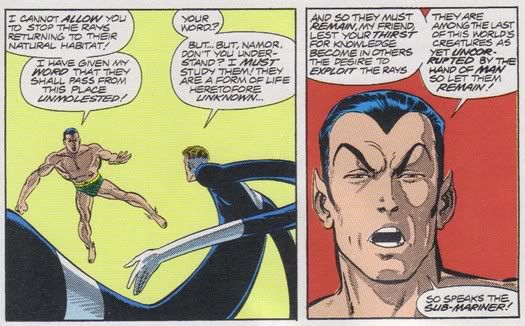
As evidenced by a more recent Namor series I'll be reviewing either tomorrow or Thursday, writers handling the character could take quite a few pages out of Byrne's book. Though they're over 20 years old now, the issues collected here hold up well and are a damn sight better than most of the attempts at reviving the character since. I hope Marvel gets at least 1 or 2 trades deeper into Byrne's run. The quality of the title declined eventually. Byrne's last issue on writing duties was Namor #33 and he stopped penciling the book before that, but while it was good, it was good.
Labels:
Graphic Novel/Comic Book Reviews
Monday, February 14, 2011
Homework
Money's tight. It always has been. My girlfriend and I were talking about ways to save. Different ways to shop. Things to sell. Things we don't need. Eating out less. Renting fewer yachts. Boats are so pre-Concord anyway.
Immediately I considered cutting out any comic book spending, but one of my New Years resolutions was to write a well-informed Best Of GN list for 2011. That's a daunting prospect without reading any comic books. I could pick just based on how cool the titles are, but I don't even know if I've ever read anything by the guy who writes Cowboy Ninja Viking.
A thought occurred to me; something that I've considered every once in a while, and it made me think that maybe the best kind of idea is the kind that helps you with more than one problem.
I allow myself far too many reasons to be intimidated. I'm intimidated by reviewing comics out of my comfort zone (i.e. comics without any capes), comics I don't like by writers I do, comics by writers I hold in too much esteem (e.g. to date I have never reviewed an Alan Moore comic), and subsequent volumes of comics I've already reviewed (I imagine it might be tough to go on too long, for example, describing the differences between Lone Wolf and Cub Vol. 18 and Lone Wolf and Cub Vol. 19, but I might be wrong). In short I'm far too intimidated, have too many reasons to be intimidated, and was surprised to learn just how many GNs I own that I've never reviewed.
On the bottom of my sidebar is a Graphic Novel homework List. Those are all the GNs I own that I haven't reviewed. I'm going to review them, and until I review every single one of them, I'm not going to buy another GN.
There will be exceptions. I won't review Incredible Hulk: Ground Zero because I've already reviewed Hulk Visionaries: Peter David Vol. 2 which reprints all of the same issues plus a few more. I won't review Thor Visionaries: Walt Simonson Vol. 1 because I've already reviewed Thor: The Ballad of Beta Ray Bill, and the latter reprints almost as many as the former. I won't review my volumes of Best of Twisted Toyfare Theatre because, well. Come on.
I may end up having to give up on that one resolution, but maybe not. Regardless, I think that my desire to come up with a Best of 2011 list comes more out of a desire to be seen as a "real" reviewer than anything else, and I think I'm kind of over that.
So I'll get over some fears and hopefully in the process I'll save enough money that we won't have to sell off our Bengal tigers. I may not earn a reputation for reviewing incredibly current comics but, come on man. They're fucking tigers.
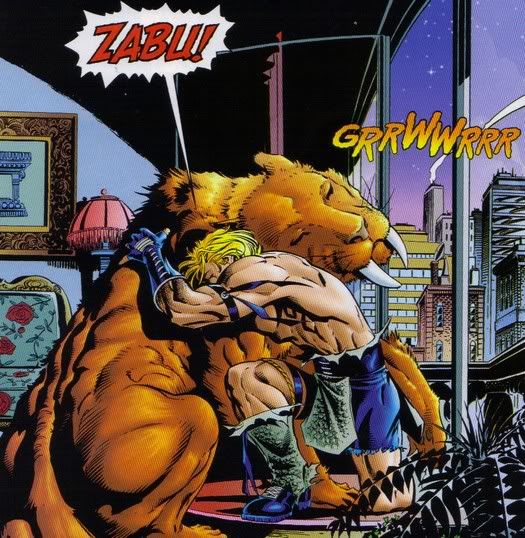
Immediately I considered cutting out any comic book spending, but one of my New Years resolutions was to write a well-informed Best Of GN list for 2011. That's a daunting prospect without reading any comic books. I could pick just based on how cool the titles are, but I don't even know if I've ever read anything by the guy who writes Cowboy Ninja Viking.
A thought occurred to me; something that I've considered every once in a while, and it made me think that maybe the best kind of idea is the kind that helps you with more than one problem.
I allow myself far too many reasons to be intimidated. I'm intimidated by reviewing comics out of my comfort zone (i.e. comics without any capes), comics I don't like by writers I do, comics by writers I hold in too much esteem (e.g. to date I have never reviewed an Alan Moore comic), and subsequent volumes of comics I've already reviewed (I imagine it might be tough to go on too long, for example, describing the differences between Lone Wolf and Cub Vol. 18 and Lone Wolf and Cub Vol. 19, but I might be wrong). In short I'm far too intimidated, have too many reasons to be intimidated, and was surprised to learn just how many GNs I own that I've never reviewed.
On the bottom of my sidebar is a Graphic Novel homework List. Those are all the GNs I own that I haven't reviewed. I'm going to review them, and until I review every single one of them, I'm not going to buy another GN.
There will be exceptions. I won't review Incredible Hulk: Ground Zero because I've already reviewed Hulk Visionaries: Peter David Vol. 2 which reprints all of the same issues plus a few more. I won't review Thor Visionaries: Walt Simonson Vol. 1 because I've already reviewed Thor: The Ballad of Beta Ray Bill, and the latter reprints almost as many as the former. I won't review my volumes of Best of Twisted Toyfare Theatre because, well. Come on.
I may end up having to give up on that one resolution, but maybe not. Regardless, I think that my desire to come up with a Best of 2011 list comes more out of a desire to be seen as a "real" reviewer than anything else, and I think I'm kind of over that.
So I'll get over some fears and hopefully in the process I'll save enough money that we won't have to sell off our Bengal tigers. I may not earn a reputation for reviewing incredibly current comics but, come on man. They're fucking tigers.

Labels:
Autobiographical
Friday, February 11, 2011
HULK IS THE STRONGEST ONE THERE IS!!!!!! : 100 Reasons to Love the Hulk part 2

Continued from last week.
51. The cover to Incredible Hulk #355, which is much funnier today than it used to be.
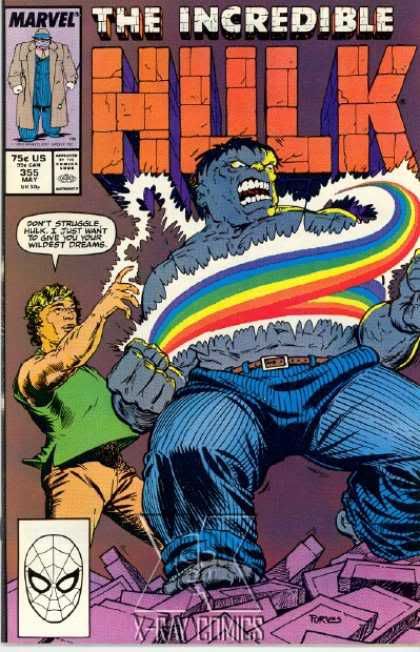
52. The Jarella stories.
53. As much as people like to say Hulk fans hate change, his many and various incarnations make him one of the most malleable superheroes in comics.
54. In Incredible Hulk: The End, we learn the Hulk can survive on eating cactus. The Hulk can help fight hunger and decrease his carbon footprint by eating crappy food that no one else can eat and leaving the mac and cheese for the rest us.
55. Over the years, Bruce Banner has occasionally returned to his secret lab in New Mexico. I just think it's kind of cool that Banner has his own little Bat-Cave, but unlike Batman he isn't in it all the time. He doesn't see the place for 5 years and then he just figures hey, what the hell, why don't I stop by?
56. There's a scene in Incredible Hulk #333, in the beginning of Peter David's run, where David does something interesting with the Hulk/Banner conflict. This was during the era of the gray Hulk, back when Banner changed to Hulk at night. As morning draws closer, the Hulk breaks into a liquor store and drinks half the store. As he changes back to Banner, there's enough alcohol left in his system to keep Banner incapacitated all day. I love the fact that the Hulk and Banner's relationship offers the opportunity for stories like that and it's a shame more writers haven't taken advantage of their conflict in similar ways.
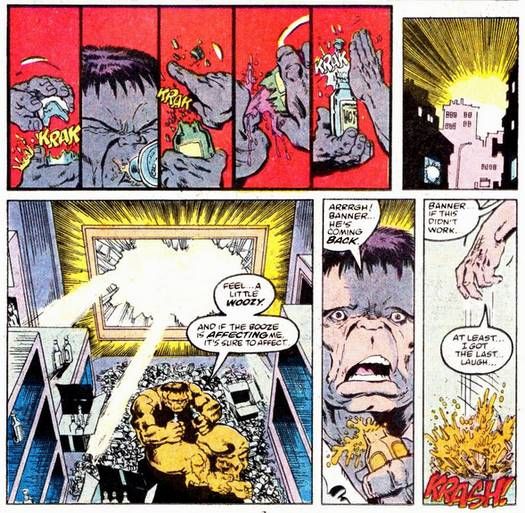
57. The U-Foes. A wonderful group of super-villains that's never been used to their full potential.
58. The two Moby Dick homage stories of Klaatu and the spaceship Andromeda. First in Incredible Hulk #s 136-137 and later in Incredible Hulk #s 306-307.
59. Mercy from Peter David's run. She was a mysterious killer, an alien if I recall, who killed people because she genuinely believed it was best for them. David had a lot of great villains who were never heard from again after he left the title.

60. The Warbound.
61. James Kochalka's 3-page strip chronicling the epic battle between the Hulk and the rain in Incredible Hulk 2001 Annual.
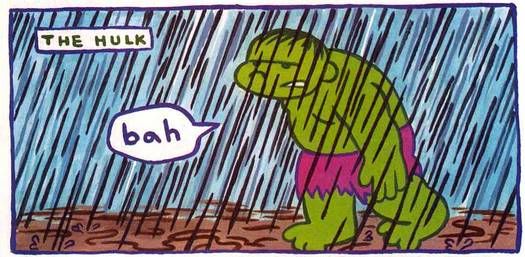
62. The Hulk fights the army. He fights cops. He fights other superheroes. If any superhero is punk, the Hulk is punk.
63. He's going to be in 5 Ronin. The Hulk is a fucking samurai.
64. Incredible Hulk: Future Imperfect
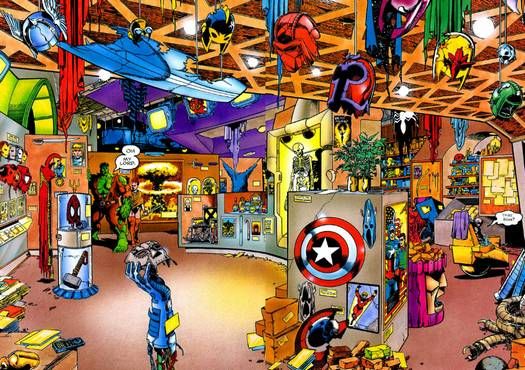
65. He's one of Marvel's only heroes to not claim New York City as his base of operations.
66. Hulk battles materialistic symbols of holidays that should be about love and peace and brotherhood and all that shit.
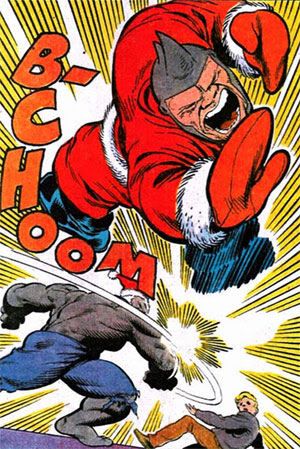
67. He's psychic. As this bit of dialogue between Hulk and Scarlet Witch proves, he predicted "Avengers Disassembled."

68. He's bipartisan. He got Clinton to develop a unique, across-the-aisle campaign strategy.
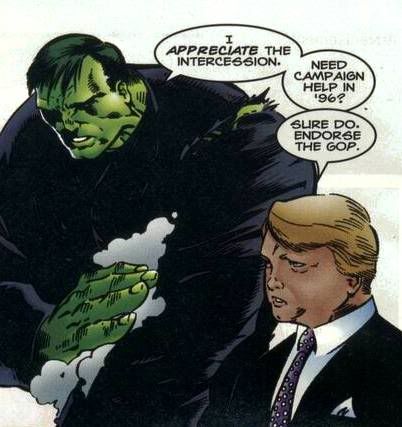
69. Jeff Purves, whose art I don't believe appeared in any other comics unfortunately (with the exception of the some Hulk stories in Marvel Comics Presents).
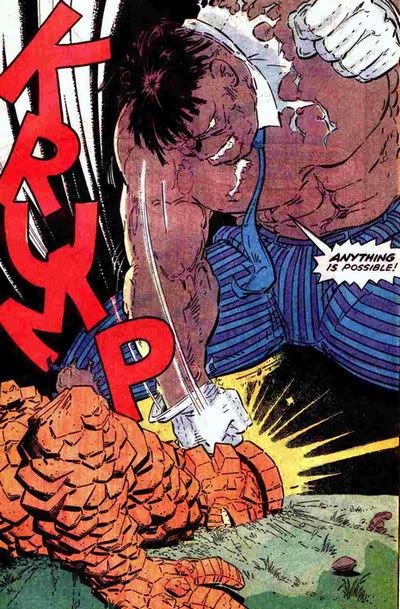
70. Incredible Hulk: The End
71. Dale Keown.
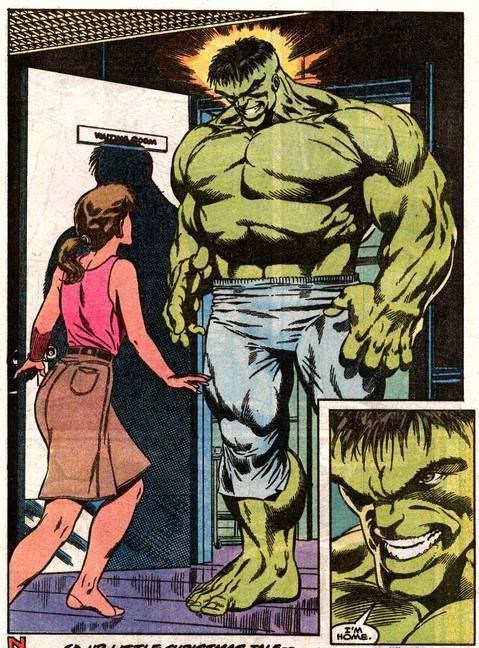
72. Incredible Hulk: Ground Zero
73. The Pantheon.
74. In Next Avengers: Heroes of Tomorrow, he's the only old school hero left.
75. He's seemingly immortal, yet in future dystopian sotires he always has long white hair and a long white beard. That's dumb. But stylish.
76. He used to be the only one who could see Dr. Strange in Strange's astral form. But the writers changed that. My guess is they just forgot.
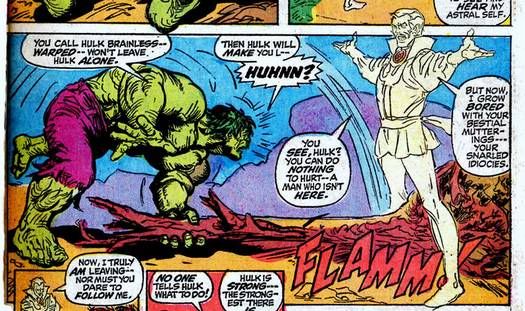
77. If John Belushi played him, he's cool. That's pretty much a given.
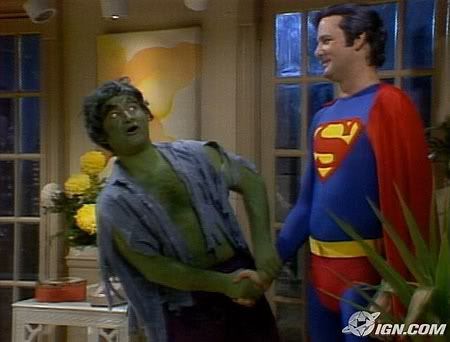
78. Few of the Hulk's villains catch on in other books. Most of the villains in Hulk's rogue's gallery that share any significant amount of time fighting other heroes are villains who "belonged" to other heroes first; like Absorbing Man (Thor) and the Rhino (Spider-Man). Some might say this is because Hulk's villains are lame. I prefer to think it means Hulk's villains are more selective.
79. He was one of the last members of the Justice League. No, really. I have proof.
80. This panel, which is just full of potential.
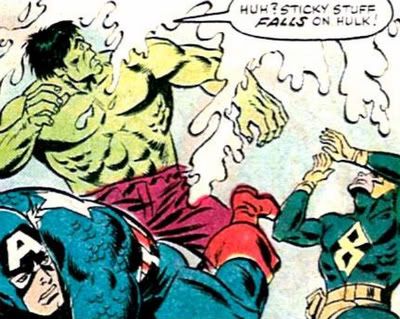
81. He now has more than one ongoing monthly, but he doesn't have an absolutely ridiculous number of ongoing monthlies.
82. I've heard it said that war helps fuel the economy because of the demand for military equipment. If that's true, then the Hulk is the best thing to ever happen to the economy, considering all the military equipment he's destroyed. They always replace the things within a few issues, so somebody's dropping some serious cash.
83. In the Marvel: Ultimate Alliance games, he's too cool to just pick. You have to do some special crap to get him.
84. He's so cool, he didn't have to even show up during Bruce Jones's run. And that was 4 years long, man.
85. His name does not include a "-man."
86. He gave Yoda something to live for.
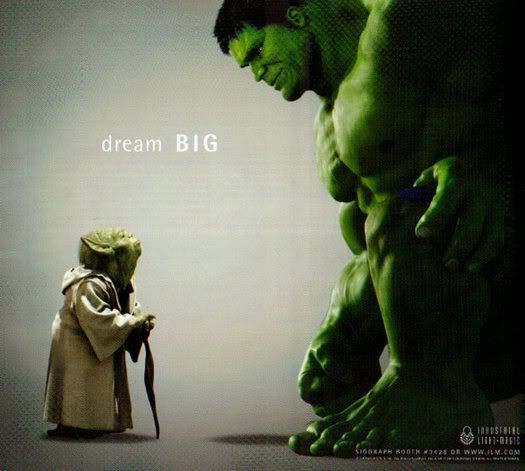
87. He's one of the only reasons anyone ever knew who Omega the Unknown was (which seems to contradict the name now that I write that out).
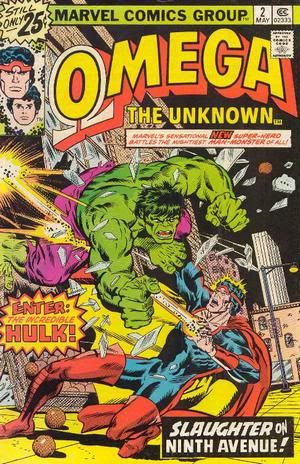
88. Rocket Raccoon.
89. The Texas Rangers.
90. The Glob.
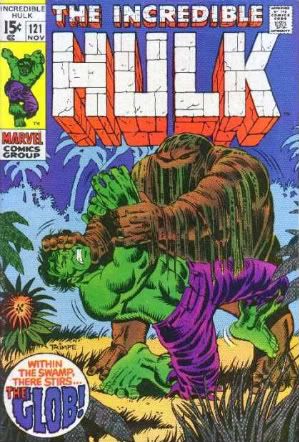
I miss the Glob. Do you miss the Glob? I totally miss the Glob.
91. Easy event names. World War Hulk. Fall of the Hulks. Planet Hulk. If only everyone could do that. Infinity Thanos. Our Superman at War. Batmanfall. Less poetic. More to the point.
92. The Hulk would know what to pick for #92.
93. Incredible Hulk #s 320-322. The Hulk vs. the Hulkbusters, Doc Samson, the West Coast Avengers, and the East Coast Avengers. Not the best story in the world, but one of the longest battles you'll ever read.
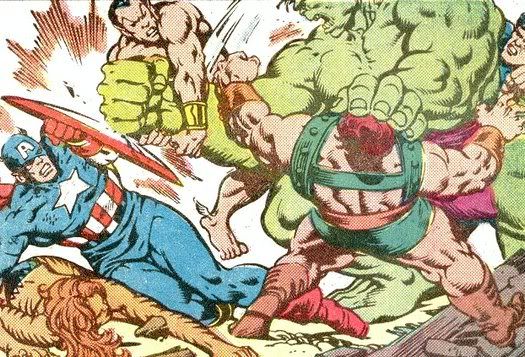
94. The anatomically correct Hulk doll.
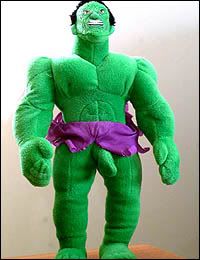
95. Green can be a problem.
96. Betty always gets her presents.
97. Hulk is a party animal.
98. Hood Hulk (Totally Not Safe For Work)
99. Christopher Nolan's director's cut of The Dark Knight
100. Still better than the Spider-Man musical.
Labels:
Hulk,
Hulk Is The Strongest One There Is
Subscribe to:
Posts (Atom)
